
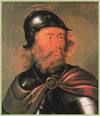
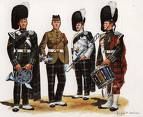
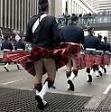






The True Untold Story of Scotland, the Celts, and Sir William Wallace |
An Address to My 1971 High School Graduating Class in Denver, Colorado (that I never gave) |
By T.L. Winslow (TLW), the Historyscoper™ |
© Copyright by T.L. Winslow. All Rights Reserved. |
Original Pub. Date: May 1971. Last Update: Sept. 10, 2025. |
Did I ever tell you the story of Scotland? Only stankin' English dogs pronounce it SKAHT-land. It's really supposed to be pronounced SKOTE-lun, the Highland way. To say it right, use your deep diaphragm and feel the body hiccup pure Scottishness from your crotch to your lips. You might or might not pronounce the d at the end, depending on whether you have enough breath left. How do I know? I'm a Scot meself. Actually, I'm a piece of American play-do, only one quarter Scot officially; my grandmother on my father's side was pure Scot. But they say I take after her, and as I get older I get more and more Scottish looking, so tell that to the boys in the flying fortresses, we're going to Tokyo, erin go bragh.


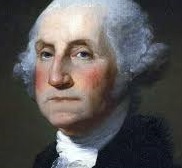


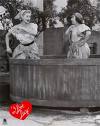
Until the 1995 Mel Gibson hit movie Braveheart, about Scottish nat. hero Sir William Wallace (1272-1305), based on the poem The Wallace (The Actes and Deidis of the Illustre and Vallyeant Campioun Schir William Wallace), by Blind Harry (Hary) (the Minstrel) (1440-92) turned millions into Scotland freaks, interest in Scottish history was nil outside Scotland. Too bad, the movie is too narrowly focused, as if the late 1200s were all she wrote, so even Braveheart nuts end up staying history ignoramuses permanently. Indeed, until TLW came along, all American Yanks were history ignoramuses, no wonder, their real history of genocide of native Americans not being much to be proud of, causing a highly truncated whitewash to be fed to them in school, starting with the Mayflower in 1620, then the Boston Tea Party in 1773 (the part about white men dressing up as Indians and blacks to commit crimes is usually glossed over), then George Washington (1732-99), the Mighty White Father of His Country, cracking his teeth on walnuts and praying every day on his knees in front of a chair while kissing a Bible, and never making us feel dirty by talking cute until he punctuates the entire century by dying theatrically in 1799 after quelling some pesky (Celtic) moonshiners in W Penn. in the Whiskey Rebellion of 1791-4, leaving the country in a mess that resulted in the horrific brother-against-brother U.S. Civil War of 1861-1865, another ugly scene best covered-up in a few soundbytes about John Brown (1800-59), the Emancipation Proclamation (1863), Pickett's Charge (1863), the Surrender at Appomattox Courthouse (1865) (a village, not a courthouse), and the Battle Hymn of the Republic (1861) by Julia Ward Howe (1819-1910), something about trampling out the vintage where the grapes of wrath are stored, which makes all the bloodshed seem not only innocuous but somehow fun and tasty, like when Lucy Ricardo trampled those grapes in that vat in the I Love Lucy episode "Lucy's Italian Movie".
So two or three centuries back was about all the history Americans ever yawned through in school, and even getting them to acknowledge that history goes back seven centuries, or that a country's father could have been 400+ years in the ground when Washington was born is an improvement.






Oh, but Americans get a great history education, in the movies, starting with Kirk Douglas (Issur Danielovitch) (1916-2020) in 1960's Spartacus, a chicken-legged portrayal of the real Thracian gladiator Spartacus (-109 to -71). Or 1963's Cleopatra, starring you're-in-violation-of-your-face chicken-legged Welshman Richard Burton (Richard Walter Jenkins Jr.) (1925-84) as Marc Antony (-83 to -30), violet-eyed Brit Elizabeth Rosemond "Liz" Taylor (1932-2011) as Cleopatra VII (-69 to -30), chicken-legged Brit Reginald Carey "Rex" Harrison (1908-90) as Julius Caesar (Lat. "hairy") (-100 to -44), and Brit Roderick Andrew Anthony Jude "Roddy" McDowall (1928-98) as Octavian (later Augustus) (-63 to 14), which ends in Antony falling on his sword and Cleo taking the asp in 30 B.C.E. There's also 1953's The Robe, starring New York City-born Jay Robinson (1930-2013) as megalomaniac Roman emperor (37-41) Caligula (12-41), and 1965's The Greatest Story Ever Told starring Swede Max (Carl Adolf) von Sydow (1929-) as Jesus Christ (-4 to 33). Oh yes, let's not forget 1959's Ben-Hur, played by super-ham Yank Charlton Heston (John Charles Carter) (1923-2008), not that he's a real historical figure, as if his audience cares, since he was so good as Moses (-1391 to -1271) in 1956's The Ten Commandments, whatever year that was set in, if it isn't another fairy tale. So, kudos to Mel Gibson for drawing huge audiences to a quintessential history flick, albeit garbled up for dramatic effect, with one love affair for each 90 minutes to sell tickets to the women, and two big battles for the men.
Now if you'd like to know what really happened, I can tell you, because I was there, I really lived back then, it only seems like yesterday, has it been that long, my how time flies, what's the matter, were all you young whippersnappers with peach fuzz on your cheeks just born yesterday?
Scotland has a long proud history of independence going back thousands of years, to Noah's Ark and the Tower of Babel. The Scots are a remnant of the once proud and noble race called the Celts (pr. with hard k), which up until the time of Julius Caesar controlled all of western Europe and the British Isles. There are no pure Celts anymore, since they are all mixed-up with the Norse, Irish, Germans, English and who knows what. But in the beginning there were pure Celts, and if you're a pet lover like me you'll save a trip to the vet's office like Betty White by trusting my quick and dirty reconstruction of their murky history.


Scotland used to be called Pictland, the land of the Picts. That's a Roman descriptive term. When they went to battle they'd come out naked with their sausages swinging out, covered with blue vegetable dye and tattoos of horrible faces (their bodies, not their sausages, er, scratch that), so they were called the Painted People, all picted up with nowhere to go, get it? The Celts actually called themselves Painted People, which in Gaelic is Cruithin, so that's where the expression "let's go cruithin" came from. :)
Picts were, you guessed it, Celts. That's pronounced with a hard C. The Celts are the forgotten people of Europe, the White Indians, the ones who got the short straw, who disappeared but left their names all over the map and in the vocabularies of languages. Celts are white people, and since everybody wants to be white, note well that their butts were as white as Crisco. Europe is the home of the Crisco butts, and they were the ones with red and brown hair, not blonde hair and blue eyes like the Norse (Nordics) way up in Thule (pronounced tool), that is, Sweden and Norway. Actually, the Celts in the British Isles had the red hair, and some in Central Europe had blonde ("fair") hair, so maybe they included some Greek and Norse transpants.

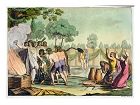


Celts (at least the ones in the British Isles) followed Druidism, a back-to-nature religion where magic is real, and everything is alive and has a spirit, like the Lady of the Lake. All that King Arthur jazz is Celtic. Fairies and pixies that haunt trees and lakes, dragons inside volcanoes, leprechauns (catch one and get a pot of gold), tommyknockers in mines (if it is about to collapse and they like you, they'll knock to warn you) - that's all Druid stuff. Modern writers like J.R.R. Tolkien (1892-1973) and C.S. Lewis (1898-1963) made careers out of stealing the Celts blind. Yes, real Druids like to worship trees (rowans), and wear funky hooded white (undyed) robes and stay up all night watching the Moon and stars, sunsets and sunrises, which was their idea of a drive-in movie, showing you they didn't have too much going between their ears, and would never produce a Newton, Einstein, or Shakespeare, but could compose one cool-sounding ode to a mouse and get the warp engines working before the spaceship crashes if they didn't drink too much single malt Scotch. They may have practiced ritual sacrifice to insure that the Sun kept rising and setting and the seasons kept cycling, and it always worked, right, so how could they deny its efficacy, although it keeps on going on even when they forget, so maybe they got smart? After the Christians took over the British Isles, they outlawed Druidism as pagan devil worship, and framed female Druids as witches. Not that Druidism was all harmless fairy tales. They did have a skull cult, causing them to chop off the heads of their enemies and bring them home with them, but they didn't eat human flesh, even sacrificial victims like the Aztecs in Mexico City, who would chop them up and mix them with hominy and chiles and make a tasty stew in their honor, yum yum. Them Mexicans had a three thousand mile Pond between them and the Romans, and there was no problemo with illegal immigration yet. Go to any back alley in Mexico City at midnight, knock three times, then flash a wad of money and ask about their "special stew"? Just kidding?
The Druids invented Halloween, the night before their New Year's Day, which for them was November 1, calling it Samhain (pr. sow-in) (end of summer), and burning bonfires after the harvest while wearing horrible masks to scare away the evil spirits of the dead. Not just bonfires though. They got off on burning thousands of men, women, and children alive in giant Wicker Man structures. When Celt warriors invaded a town such as Rome, they would go to a house, knock, and greet the horrified lady with the sight of their swinging sausages, tats and Halloween masks, shouting "Trick or Treat", meaning, do a trick for me and give me a treat or I'll just take it anyway. Next time you take your kid out trick-or-treating, remember that and see how laundered it's become.
Actually it was a good idea to fight in the nude back then, since clothes were filthy and nobody knew anything about germs or antiseptics or antibiotics, so after weeks of wiping your ass with a leaf or twig, then wiping your fingers on your clothes, if a wound got some of that filthy clothing in it, it would more likely be fatal from the salmonella, E. coli and other bacteria. Of course, there were tradeoffs. To fight naked you have to protect your danglies, but you also have to prevent gut wounds. I'd rather lose a nut than have my guts slashed, spreading my shit into my bloodstream and creating a terrible infection that eats me alive. I can still planter with one peanut.
Speaking of clothes, the Celts invented the word that the Romans stole as "camisia", meaning shirt or chemise. Celtic mehttps://www.quora.com/Why-did-Scots-wear-kilts-What-was-the-practical-purpose/answer/Steven-J-Owens">kilt came from. The Romans loved imported cloth and clothes from Celtic peoples, but seem to have invented the chemise from the tunic.
The ancient Celts were white yes, but about two steps above the Neanderthals, no different than the Norse and the Germans. Civilization, which relied on a moist stable region to establish agriculture spread from east to west, starting in China, Mesopotamia, and Egypt, and Celtland was the last to get it, out in the wild wild wild wild West. Celts were all dyslexic, like Mel Gibson, and didn't like to read, write or live in big cities or specialize economically like the citified Romans, inventors of the blue collar worker, much less the effeminate Chinese, inventors of spectacles and silk dayjamas. They were savage hillbillies, like the ones in the Appalachians in the novel "Deliverance" (who are mainly of Celtic descent), and lived in small settlements with small farms, keeping their wives (probably a close relative or even their sister?) barefoot and pregnant and raising a bunch of wee bairns in their shitty huts, and their history and culture were transmitted orally, highly embellished with magic and legend. In contrast to the clean-shaven short-haired Romans, Celtic men liked to wear big beards and long hair, often tied behind their backs. Hair is a Celtic trademark, that's why they invented the Beatles. The women had so much hair between their legs that it's hard to figure out where to poke them. Just kidding. Chinese men have straggly beards, American Indian men have no beards, but Celts make up for them several times over. Imagine what kind of women it would take to live with a filthy bush in her face every night like that. Or should I say his face? Just kidding.

They didn't actually call themselves Celts. It was the Greeks who started calling them Keltoi, meaning hidden people, since they kept everything in their heads and didn't write it down, for your eyes only, darling. They knew this because the Celts dealt with them regularly, trading grain and gold to get what they wanted most, wine, and they could have learned writing from the Greeks but thought that it was better to keep everything a state secret, relying on bards who memorized everything like in Fahrenheit 451.
The Celts called themselves Gaels, and when the Irish Celts invaded Pictish Britain, the latter called them Goidels ("gwyddel" = savages). Celts spoke the beautiful but weird Gaelic (Goidelic) Language, an Indo-European language descended from Sanskrit, and different from the others in dropping the initial p from syllables (orc instead of pork, porcus, porci, etc.), among other things. If you're a man with a babe giving you benefits, tell her tonight that you're feeling a bit Scottish and would like a wee bit of ussy. There are six known Celtic languages. Some scholars call the language Celtic not Gaelic, and claim that it was a lingua franca developed to trade with the Phoenicians and Greeks, and limit the term Gaelic to the Scottish dialect. Goidelic Gaelic splits from Brythonic Galic by preserving the hard c sound, which turns into p in Brythonic (Irish mac becomes Welsh map).
The Celts begin fighting for their free-ee-ee-dom? About 3000 B.C.E. the Celts (from the Greek word Keltoi, meaning hidden people), a fusion of Mediterranean, Alpine, and Nordic strains, incl. a dark Iberian and a blonde stock, and known, like Slavs, for big beards (compared to Chinese who have stubble beards, Ethiopians who have curly beards, and Am. aborigines, who are bare-faced) appear in N Europe; their Indo-European Gaelic Language drops the p sound in the initial or medial position (Lat. porcus becomes Gael. orc); they eventually form more than 150 distinct tribes, incl. the Britons in Britain, the Gauls in France, and the Goidels (Gaels) in Ireland, Scotland, and the Isle of Man; Goidelic Gaelic splits from Brythonic Galic by preserving the hard c sound, which turns into p in Brythonic (Irish mac becomes Welsh map); they practice the Druid Religion (Gr. "drus" = oak tree), which worships trees (rowans), practices magical ceremonies, and believes in the Sun god Belenus (Beli Mawr) ("the shining one"), the goddess of victory Andraste, tree genies, Earth gods, and elfin demons; they fail to develop a written lit., relying on oral transmission by bards, filid (poets), scelaige (narrators), and entertainers; although they have no alphabet, symbols they use incl. the cross, swastika (fylfot), and trefoil (trivet), plus the colors and weaves later used in Scottish tartans; the ancient Britons were cannibals; the social org. is tribal and clannish, preventing consolidation into a central govt., which proves their weakness and undoing?About 3000 B.C.E. Ireland is inhabited by Neolithic farmers originally from Anatolia, who leave stone circles, dolmens, and great monuments in the Boyne Valley.
About 2500 B.C. Bronze Age Bell Beaker people arrived in Ireland from E Europe, who were descended from horse herders on the Pontic Steppe; they go on to wipe out the Neolithic pop. with infection diseases?
About 1500 B.C.E. the Picts traditionally migrated from Brittany to Ireland, were refused permission to stay, but allowed to settle in NE Scotland on the condition that each Pictish king marry an Irish princess, since Pict society is matriarchal.
The Celts basically liked their freedom, and resisted unification efforts, so it's hard to decide who back then was a Celt and who wasn't. By 1200 B.C.E. the Celts in Britain consisted of three stocks, the Goidels (Gaels) in N Ireland and the Scottish highlands, and the Cimbri (Cymbri) (Cymri) (Combroges) ("co-landers") (Welsh) and Britons (Brythons) (kin to the Belgae in Gaul) in Wales and the lowlands. The Cimbri started in Jutland, giving their name to Cumberland, and might have been Germanic. Also about 1200 B.C.E. the port of Lisbon on the Tagus River in Lusitania ("land of the raven people") (modern-day Portugal) (orginally called Allis Ubbo, meaning "safe harbor" in Phoenician, later corrupted to Ulisaypo or Olissipo from the belief that Ulysses of Trojan War fame founded it) was founded by Celts and an aboriginal pop., who later formed the Cempsi tribe, known for convex-head arched-neck Lusitanian horses, the best for chariot racing.
Either way, the Gaelic-speaking tribes ran Central and Western Europe and the British Isles from about 1000 B.C.E. on. At first they were in the Bronze Age, but about 730 (800?) B.C.E. the Hallstatt Iron Age Culture, characterized by iron and bronze swords with winged metal terminals and horse domestication evolved from the Urnfield Culture, and began spreading from Austria to France, Belgium, Netherlands, Iberia, and Ireland, launching the Iron Age in Europe (until -400), speaking a proto-Celtic language that became the ancestor of all later Celtic languages, branching into separate Celtiberian, Goidelic, and Byrthonic tongues; named from a necropolis containing 2K graves in Hallstatt in Upper Austria, excavated in 1846-99, site of a huge salt mine which they traded for their favorite drink. They may all trace back to the wild Norse tribes in the Baltic, like the Germans do, or might come from somewhere else, but Gaelic and Norse are both Indo-European languages, based on Sanskrit, ask a Nazi about the Aryans sometime and whip out your sausage and sword.
However they got their start, the Celts always controlled the west side of the Rhine, including Gaul, inhabited by the Gauls; Belgium, inhabited by the Belgi or Belgae ("sacred oak tree") (a Cimbri tribe?); the Alps, inhabited by the Helvetii (originally from Germany), and the Po Valley in northern Italy, inhabited by the Boii or Boians (whose name ends up in Bourbon, Bologna, Bohemia, and Bavaria). Unfortunately, the murky origins of the Welsh and Irish lead some writers into weird theories, such as Sir William Betham (1779-1853), who claims they were originally the Semitic Phoenicians who turned left at the Rocky Mts., check back with me when you figure out where the Lost Ark of the Covenant is.
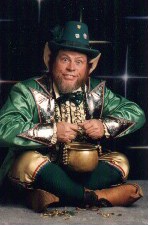
Everybody knows that the top of the Italian boot has two ranges of Alps across it, with the Po Valley in the middle, known for the Po River, which is called that because it's as little as a foot deep in some places, hence is a po excuse for a river. The main tribe in the lowlands of the British Isles was guess what? Answer: The Celtic Britons (Brythons). There were actually 150 different tribes of Celts in Europe and the Isles, which was just the problem, it was easy to divide and conquer them. Ireland was also controlled by Celts, but when they first invaded they encountered an aboriginal race of them red-haired leprechaun-looking people that only live there, you know what I mean, take James Cagney or Denver's Rocky the Leprechaun. After being driven to the N side of the Emerald Isle, they settled down, intermixed and eventually became friends, I think, ask them. The handsome chic Kennedys, America's royal family are pretty much pure Celt. They come from Leinster in SE Ireland, and even their name Kennedy is Gaelic, meaning helmet or deformed or ugly head. Funny, Kenneth in Gaelic means handsome, so maybe it should be John F. Handsome, but then, John F. Deformed Head sounds like a prophecy, take your pick, it's about their looks either way.
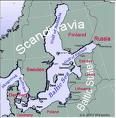
What about the Germans? Actually, at first there weren't any, just Norse. Life was hard but liveable on the cold foggy Baltic Sea, where there was plenty of shop-smart seafood, pass the pickled herring and the rotted whale meat. Germany was all Black Forest probably, and there was no sunlight coming through to grow your miserable turnips even if you could plow the land with sticks, since they didn't have iron plows yet. Even then you might get a wild boar's tusk up your ass if you stooped over, so who wants to live there unless as a well-armed hunter, hiding behind every tree? Only as the Norse overpopulated did the excess have to hack their way into the interior for Lebensraum, and slowly diverge into the Germans, the original white trash, who actually call themselves the Deutsch, meaning Village People. The German language descended from Norse, just like dogs smell each other's butts. While modern Norse are still mainly racially pure because who wants to move into freezing cold Norway and Switzerland, the modern Germans are intermixed with Celts, Slavs, Mongols, who knows what, ask Herr Hitler why he's hiding Jewish ancestry. There might be more blonde Norse in Ukraine than Germany, ask Google.
The Celtic culture in Central Europe was very aristocratic, the aristocrats wearing a gold torc around their peter, er, hey hey we're the Monkees, necks as symbols of authority, and always insisting on being buried with a load of bling, causing the pop. to always have to dig for gold, so that by Caesar's time there were 400+ gold mines in Gaul alone, which proved to be their undoing when he found out about it and devoted his career to stealing it. The aristocrats also liked to wear conical caps made of birch bark, and delicate gold-inlaid shoes. When the Romans began fighting them, they considered them giants since their average height was 5'9"-5'10" vs. 5'6" for the Romans.

About 3000-2500 B.C.E. Stonehenge was built on the Salisbury Plain of S England, probably by the Celts (if not, they would've wanted it), and it was used until 1500 B.C.E. to spend the boring nights watching the latest network shows from Celestial Net, including the Moon, the Stars, and the Sun, with occasional Comet specials, and Eclipse horror shows. Life was pretty slow back then for them Celts dressed in skins and holding torches in a stone henge or circle. But they developed a rich culture with songs and poetry, transmitted orally. Too bad they didn't have an alphabet or Bermuda shorts back then. At least life was over at age 40.
About 600 B.C.E. the Celts, Goidels, Brythons (Britons), and Saxons (Gael. Sasunnach or Sassenach) began settling Scotland, joining the Neolithic peoples from the Mediterranean already settled there, followed in ? by the Picts. Also in this cent. Gauls (Celts) settled Ireland, subduing the Neolithic inhabitants and creating the Fifths of Ireland, incl. Ulster (north), Connaught (west) (home of the Wild West family of Connaught Eastwood?), Leinster (east), and (East and West, or undivided?) Munster (Muma) (south) (home of Herman and Lily?) - the gall of it?
In 101 B.C.E. the Romans under proconsul Quintus Lutatius Catulus defeated the Germanic Cimbri at the Battle of Vercellae (modern-day Vercelli) on the Raudine Plain in Cisalpine Gaul (N Italy); seeing the battle lost, the women kill their children and commit suicide rather than end up as Roman slaves, which doesn't prevent the Romans from killing 140K and capturing 60K incl. many women and children, many of whom join Spartacus in the Third Servile War of -73 to -71; the remaining descendants of the Cimbri and Teutones became the Audatici of Belgium, according to Julius Caesar.
As the BCE/CE Interface (AKA the Butt Crack of Eternity) arrived, the reason that the Celts were a lost cause is that they were incurably tribal and clannish, indomitable as they say. Despite every chance, they never formed a United States of Celtland, or had an emperor of the Celts with a capital city, royal roads and royal library, anything like that. They didn't even have an alphabet, causing their rich poetry and songs to have to be transmitted orally, and now mainly lost. Celts were basically self-sufficient men. They just wanted to be free. They would bow to no man, thus they were very democratic, in the sense that they were hard to rule because every man could take care of himself and votes were done with one hand raised in the air and the other gripping a weapon, not exactly a police state where people shake in their boots at the thought of getting a ticket. Today's Celtic holdouts don't pay their taxes or obey the speed limit, and have their private whiskey still hidden in the woods. One thing Celts want is respect, and their chiefs had to earn it, not that they even wanted a chief unless it was to lead them into war to defend their precious free-ee-dom, although some think they also had peace chiefs, usually women priestesses.


Erin go bragh! Say that with a Scottish accent! That's the favorite Celtic war cry. It's like a cultural ID tag. It means freedom forever, literally "Freedom until Judgment Day". That particular spelling first cropped up in the U.S.-Mexican War of 1846-8, when an Irish brigade used it on their banner. Erin, or Eireann, also known as Ireland, means land of the free. Hell is filled with Celts who died with those words on their lips. The real meaning is "Go over there baby and take off your bra". The Freedom Bra. Just kidding, although the female Picts did fight naked, with their bodacious tatas flopping around and their fur patches showing. You could have it, if you could kick their butt first. Oops, what was that, Roman boy? I just cut off your sausage and meatballs along with your head and stuck it in your mouth. You're Italian so you like spaghetti and meatballs, right? Let me help you eat me, there you are. Next? Xena: Warrior Princess was really about a Celt babe with the wrong makeup and costume and writers, who were history pikers. Speaking of pikers, the very word Celt first appeared in English in 1707 with the Act of Union.
Back to the real Celts. Usually chieftains were elected, and they were smart enough to elect a virile, grown man, not some infant like the effeminate overcivilized nations do, often an uncle or brother of the deceased chief. But not always. The Druidic Celts were known for equal rights for women, and would even elect a woman if she were six feet tall and could kick everybody's butt and won their respect. The Druid religion wasn't rigged to deny women the top position like everywhere else. In the overcivilized east, the religions were all patriarchal, meaning that God is male, and it was a theoretical con game that a woman could never become high priest of the Jews, or Pope, no matter how much merit she possessed, because she squatted to pee and menstruated and had no testicles and dropped babies and went into mommy mode, thus was marked by God for inferiority, and thus even the lowest man was considered more fitting than the highest woman for the, ahem, top position. That attitude is still with us today, in the treatment of female CIA spies who fall in love with foreign nationals and can't do them and dump them for God and Country like Bond, James Bond. But in Celtic culture, individual merit is everything, and even a lowly squire can become king if he has the merit to take the sword from the stone, the spirits have spoken. In that way the Celts had equal opportunity for men and women. But don't confuse that with equal results. Most women were kept barefoot and pregnant after they lost their physical contest, although if they were good listeners they might pass themselves off as seers and become Druidic priestesses. Yes, one might argue that the lack of a male supremacist establishment was their fatal weakness, by my soul you're the prettiest boy I ever saw in my life, she's a child no longer and there's something masterful about her.
Civilization is what? The systematic elimination of freedom in the name of more and more rules. It's highly unnatural to those born free and wild. It seems to be a function of population density, a natural self-defense mechanism, where the masses control the individual with officials and laws to keep anybody from doing anything out of the ordinary without going through hell. Civilization started in China and moved east, and Scotland, being as far west as you can get, never got it. The entire history of Scotland is about crazy bizarre weird Gaelic-speaking wild men who just want to be left alone so they can go back to getting their wee ussy in the hay loft, their idea of war being a clan war over land and new ussy, and their idea of a chieftain being their father or uncle, who might actually be their brother or son, or occasionally, usually during time of peace, a female eace chief who put up a good act at rophesy, there are times when only a man can do a man's work. Okay, I tried to get too many laughs out of ussy, so I'll stop.

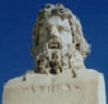
Up until the rise of the Greeks, everything was cool, and then Greek sailor Pytheas of Massilia (-380 to -300), seeking to circumvent the Phoenician monopoly visited the British Isles and checked it out around 330 B.C.E., in the days of Alexander III the Great (-356 to -323), and reported back, which could have been bad, but the know-it-all philosopher geniuses back in Greece thought he was a space cowboy and didn't believe him, so they never followed up, else we'd all be speaking Greek today. Seeking to circumvent the Phoenician monopoly, Pytheas set sail from Massalia (Marseille), passing through Gibraltar then sailing N as far the British Isles, the coasts of France and Denmark, the Shetland (Zetland) Islands, and possibly to Iceland and Norway, which he called Thule (because if you try to pee you'll freeze your tool?), and the mouth of the Don River in the Black Sea; being the first literate explorer of these areas, he referred to the British Isles as the Isles of the Pretani (Britanni) ("people of the designs"), made up of Irish Cruithin (Gael. "painted or tattooed people"), Scottish Picts (Lat. "painted or tattooed people") and Welsh Britons; he also developed the use of North Star sightings to determine latitude, and discovered that tides are related to the phases of the Moon. Or maybe it was that the freezing stormy Atlantic was too much for these bare-backed Greek wusses used to the warm, mild panytwaist sailing of Club Med. Too bad, the Romans, who started in the Tiber River Valley in the center of the Italian peninsula, kept clawing their way out, kicking the butts of all the tribes in their way, the main obstacle being the Etruscans, and after reaching the neck and going east and running out of butt to kick, the only way left was to go west, so the fun started.

Not that the Celts are completely innocent victims of aggression. Every dog has their day, including them. Way back in 387 B.C.E., when only the Greeks were what you call civilized, the Gauls overbred and needed Lebensraum, and a huge 200K-300K-man army led by Brennus (their version of Alexander the Great) went east and south over the Alps, invading the Italian peninsula, defeating the Etruscans and Romans and getting all the way to Rome, which they sacked, back when it was a miserable bunch of villages on seven hills and no wall. After the Gauls took six of the seven hills, the Romans made their final stand on the Capitoline Hill, and stalled them long enough to regroup and kick them out. According to Roman history they were saved from a sneak attack by the honking of their sacred geese after their guard dogs flubbed up, but I think dysentery would be closer to the truth. I suppose them geese honked their big swinging sausages and sent them running. That's why the Romans later went east instead of west, because they didn't want another taste of Celt for a long time when there was something easier available.
Not that all Celts were illiterate. Some Celts could read and write, which makes sense since how else could they sell wine to the Romans? The possibly/probably Celtic Leopontic Inscriptions, in a script derived from Etruscan were made in Lugano, Switzerland incl. Lake Como and Lake Maggiore from about 600 B.C.E. to 100 B.C.E. Too bad, literacy didn't become widespread, and we'll never know who killed J.R. because the season was cancelled. There were also Celtiberian inscriptions found mainly on Celtic coins, I guess they kept a few learned men around, not enough to spare for complete history books, I wish I wish.
In 280 B.C.E. more Gauls went east, taking Thrace and Macedonia, then crossing the Bosphorus at the Greek city of Byzantium (which became Constantinople in 330, and Istanbul in 1930) and into Asia Minor, and creating Galatia (Gaul-atia, get it?), where St. Paul later founded a church and wrote the bestselling Epistle to the Galatians to. If only they could have united, we might all be speaking Gaelic now and have to get used to kissing somebody after they ate raw hamburger. But alas, you can't cure their hillbilly tendencies, so they frittered away their advantage while the Romans caught up and overtook them. In short, they failed to unify and centralize their authority, preferring to endlessly war with each other. Let's not forget the Galileans, the focus of Jesus Christ's entire ministry, and Apostle Philip, who preched in S Gaul.
About 250 B.C.E. the La Tene (Tène) Iron Age Celtics invaded Britain, and their culture gained predominance, making excellent swords and helmets, jewelry, horse harnesses, and pottery.

The first sign of weakness was in 241 B.C.E., when the Gauls got their butts kicked in Asia Minor, and became known as the Dying Gauls. From then on it was all downhill.

The next big break for the Romans came soon, in 222 B.C.E., when they took the key Celtic Po Valley town of Mediolanum, (Lat. "medio" + "planum" = center of the plain), now called Milan. Those were the days of elephant-riding Carthaginian general Hannibal (-247 to -182) from North Africa, who teamed with the Celts in Gaul and the Po Valley to invade Rome and finish them off around 218 B.C.E., only to find out how tough and organized these blue collar workers really were, and got his army exterminated, along with his home base of Carthage in the crazy crackalackin' mamajama Battle of Zama on Oct. 19, 202 B.C., while the Celts got kicked out of Spain in the process. The Po Valley was cleared in 191 B.C.E., and the door to Gaul was open. The Boii fled to Boiimia (Bohemia), although they later disappeared there in the Slavic tide. Still, the main body in Gaul and Belgium held their own until the time of Julius Caesar, their Antichrist Hitler.
From the Celtic point of view, the Roman soldiers were mercenaries kissing the foot of an emperor and trespassing in their country where they had no business, and had no respect for them, their language, culture or history, and if they want to take their freedom, it'll be over their dead bodies, no other way, because they're fighting for their families, keeping their wives from being raped and their ancestral lands from being stolen, and would rather die a free man than live a slave. Don't push this civilization culture thingie on them as a cover story either. They just wanted to live like the ignorant backward morons their fathers made them, and pass it on to their children, along with a funny accent, and u-u-u-ck you.
The Romans may have started out as wild as the Celts, but times had changed them. Having gotten a taste of both Greek democracy and sick effiminate eastern civilization, where people are cattle to be conquered and enslaved to make those at the top rich, and he who has the money rules, they conquered their own peninsula and then set out to expand as far and wide as they could, fighting not for their freedom but to take away freedom, and rape, rob and enslave so that the aristocrats could live in ostentatious sin and luxury like high devils in Hell, which is probably where the Christians got the idea of what it was like. So naturally they cleared the Celts out everywhere they found them, and took the ones they didn't kill and put them into the slave labor plantations. To Romans, Celts were like cockroaches. If you see some big stag cockroaches in your kitchen, and kill them with a shot of Raid, there's still a thousand behind the walls, breeding faster than you can kill them, in the egg nests, which your Raid can't reach. It was an endless bother, I suppose, from their point of view. Maybe they thought of Celts as products of Nature, to be harvested, if you could take their swords and spears away.
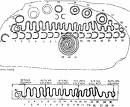
Not that the Celts were ignorant bums. In the 1st cent. B.C.E. the Coligny Calendar, a 60 in. x 42 in. bronze plaque was made by the Celts in Gaul, displaying a lunar calendar where months begin with the full moon, off about 1.5 days every 30 years, compared to 0.25 days every 30 years for the Julian Calendar; days start at sunset, and each 15 nights is a Celtic week, either the bright week or the dark week; the new year starts on Nov. 1, when the Celts celebrate Samhain (Samain) (summer's end). Also in the 1st cent. B.C.E. the Celts began using the huge, smart, mean Irish Wolfhound as war dogs, for wild boar and wolf hunting, and dog fighting; they almost died out by the middle of the 19th cent. C.E. before being restored in a gentler version.


Yes, it was Julius Caesar (-100 to -44), born via Caesarean section in 100 B.C.E., who practically exterminated them from the Continent. Caesar devoted his entire career to killing Celts, and not without reason. He got the idea from Greek superbrain Posidonius of Apameia (Rhodes) (-135 to -51), the founder of National Greekographic, who visited the Gauls when little Ceasey was shitting yellow, and wrote a book on them, which was published in 80 B.C.E., and helped him decide how he would spend his life. It talked about their Druid religion and its equal treatment of women, but smeared them with the false allegation of cannibalism. Not that Caesar didn't have his own personal reasons. After all, they raped his great-great-great-great grandmother, and had no respect for the male supremacist gods on Mount Olympus. In 58 B.C.E., when he was 42 years old and at the time of life when he had to think about feathering his nest for retirement, the Senate gave him a 5-year mission, should he decide to accept it, to explore strange new lands in the wild west and kill every Celt he could get his hands on, then steal all their wealth and make slaves to take back to Rome for a big parade, and in eight expeditions he divided and conquered them tribe by tribe, killing a million Celts and wiping them out of the Continent. To show how magnanimous he was, he pardoned the last fifteen thousand Belgi after first having their right (sword/spear-throwing) arms chopped off so his war mastiffs could have a treat. Belgium was sure a funny-looking country after that, but at least their Gaelic language survived enough to help form French and Walloon. Meanwhile, since they were supposed to wipe with their left hand and shake with their right, who wanted to shake a Belgi's hand? Funny that Gene Roddenberry picked the name Captain Kirk for a futuristic Caesar controlled by a Prime Directive. The Germans helped Caesar by sandwiching the Celts in a 2-front war. He then chased the Germans back over the Rhine and turned Gaul into a Roman province with Roman settlers, an evening walk in the forest, flowers, and fields.
About 58 B.C.E. Caesar coined the term "Germanic" for the tribes living N of the Rhine, and "Celtic" for the tribes living S of the Rhine; Gallia Transalpina (Galla Ulterior) (which looks like a giant smorgasboard to the Romans) is split between three main nations, the tall, fair, gregarious Celtic Belgae (Belgi) (Gael. "sacred tree") tribe in the N (to the Rhine), the rest of the Celts in the middle, and the dark-complected Tarbelli in the SW (Aquitaine), who prefer to fight in small bands; "Physically the Celts are terrifying in appearance with deep-sounding and very harsh voices. In conversation they use few words and speak in riddles, for the most part hinting at things and leaving a great deal to be understood. They frequently exaggerate with the aim of extolling themselves and diminishing the status of others. They are boasters and threateners, and given to bombastic self-dramatization, and yet they are quick of mind and with good natural ability for learning" (Diodorus Siculus); the major tribes in Belgian Gaul are the seafaring Menapii in N Gaul in the mouth of the Rhine River S along the Scheldt River, with main city of Cassel near Tarwanna, the Nervii (of Germanic origin?) S of them (E of the Scheldt River), the Morini (Gael. "people of the Sea") on the NW coast based in Boulogne-sur-Mer and Tarwanna (Tervanna) (modern-day Therouanne), and the Caleti on the coast, the Remi between the Mosa (Meuse) and the Matrona (Marne) (incl. the town of Durocorter or Reims), the Suessiones (Suessones) in Soissons, the Meldi ("honey people") on the Marne River (near modern-day Meaux), the Catuvellauni N of the Sequana (Seine) River, the Treveri (Treviri) in the lower Moselle River Valley, the Mediomatrici W of the Vosges River, with capital at Divodurum (modern-day Metz), the Lingones, with capital at Andematunnum ("fortress of the great bear") on the Marne River near modern-day Langres, the coastal 5-tribe confederation of Armorica (Aremorica) (Celt. "near the sea") between the Seine and Loire Rivers, incl. the Osismii ("deer people") in Finis Terrae (Lat. "ends of the Earth") in Brittany with capital at Vorgium (modern-day Carhaix) (known for trading with Ireland and Britain), the Redones (Rhedones) on the Liger (Loire) River, with capital at Condate (modern-day Rennes), the Veneti and the Venelli (Unelli) in Normandy, the Sequani in the Jura Mts. (known for their smoked ham), the Helvetii in W Switzerland (composed of the Verbigeni, Tigurini, Toygenoi, and one other subgroup), the Carnutes and Senones N of the Liger (Loire) River (modern-day Chartres, Orleans and Blois) (political and reigious center of Gaul), the Pictones (Pictavi) along the Bay of Biscay in W Gaul (most civilized and independent Celtic tribe?), the Bituriges ("rulers of the world", "perpetual kings") S of the Liger (Loire) River, with capital at Burdigala (Bordeaux) on the Garunna (Garonne) River, the Aedui (Haedui) (Hedui) between the Liger (Loire) and Arar (Saone) Rivers (modern-day Burgundy) (known for being friendly with the Romans), the Santones (Santoni) (Santii) in modern-day Saintonge around the town of Saintes, Arverni in Auvergne around the town of Gergovia (modern-day Clermont-Ferrand), the Ruteni ("blondes") in Averyron (known as producers of lead), the Lemovices (Lemovici) in modern-day Limousin and Poitou, the Volcae and Tectosages (Tectosagii) in S Gaul, the Vulgientes (Vordenses) in SE Gaul, with capital at Apt, which Caesar changes to Apta Julia and beautifies; the Allobroges inhabit the Rhone Valley, incl. the key town of Lugdunum (modern-day Lyons) at the estuary of the Rhine River at the confluence of the Rhodanus (Rhone), Saone and Liger (Loire) Rivers, along with Cularo (modern-day Grenoble) on the Isere River 75 mi. SE of Lugdunum; the Vocantii (whose patron goddess is Andarta, goddess of fertility) inhabit the Rhone Valley and Alps to the S of the Allobroges; Gallia Cisalpina (Galla Citerior) (Po River Valley) is inhabited by the Celtic Boii, along with the Cenomani and Insubres (Insubri) in Insubria (modern-day Lombardy) (founders of Mediolanum or Milan); Gallia Provincia (Provence) (Province), the SE neck around the Mediterranean coast between the Alps and Pyrenees features the towns of Tolosa (Toulouse), Carcaso, Narbo (Narbonne), Massila (Marseille), Arelate (Arelas) (Arles), and Valentia; Flanders (Vaanderen), the region around the city of Bruges is inhabited by Celts; the Parisii inhabit Paris and the Seine Valley; Carnac on the Gulf of Morbihan in S Brittany 20 mi. SE of Lorient has the Carnac Stones, 1,991 granite menhirs arranged in 11 parallel rows, with a curved row of 18 stones at one end; about 1.5 mi. from Carnac Le Bosseno (a group of mounds) contains the remains of Caesar's Camp. In the spring Julius Caesar the Celt-Killer, proconsul in Gaul, using Narbonensis in the S as a base begins a series of annual campaigns in Gaul, first conquering the Suebi and killing their chieftain Ariovistus after all 370K of them begin a mass migration from W Switzerland to S Gaul under German pressure, right into Caesar's lap, and after killing 120K he orders the rest to return to their homeland and submit to Roman rule; he then strikes deeper into Gaul, and they come out naked with short stabbing swords and fight for their free-ee-ee-dom, almost destroying his armies, but he holds on and kicks their butts with superior military org. and discipline in eight campaigns of the Gallic Rapes, er, Gallic Wars, making use of the fact that they have a 2-front war going on with the Germans across the Rhine to divide and conquer, systematically exterminating them and setting Gaul up for Roman colonization while stealing their wealth to make himself rich; he eventually kills 1M of 10M, and enslaves another 1M; Caesar conquers Vesontio (modern-day Besancon) on the Doubs River (47 mi. E of modern-day Dijon), the principal town of the Sequani; meanwhile after a 3-year planning period, 260K Helvetii (mainly women and children?), led by Orgetorix strike out toward Gaul with the intention of (conquering it?) and settling among the Santoni between Poitiers and Bordeaux, using scorched earth tactics and gaining recruits as they go, reaching 200K-365K total (incl. 16K-40K warriors), reaching Geneva, only to find that Caesar and his 30K-man army have beat them to it and dismantled the bridge, after which they bypass him by going N over the Jura Mts. and ravaging the lands of the Aedui, who call on Caesar for aid, then crossing the Saone River; too bad, Caesar ambushes the last quarter of their forces on the E bank, incl. the Tigurini, and after negotiations fall through, the Helvetii defeat Caesar and continue their journey, while the rest of Caesar's army is stalled waiting for grain shipments, which are held up by the Aedui because its chieftain Dumnorix is the hubby of Orgetorix' daughter; after Caesar catches back up with them, he defeats them at the Battle of Bibracte (one of the 12 biggest towns in decentralized Gaul, which has no king and no capital city, and revolts civilized Romans with tales of the equality of women?), slaughtering and enslaving 250K and capturing most of their baggage as they flee to the lands of the Lingones on the Langres Plateau; after waiting three days to soften them up (or to lick his wounds), and ordering the Lingones not to help them, Caesar accepts their surrender and allows the remaining 110K to return home on the condition (foedus) that they supply fighting men on request; too bad, they lose their foederati status when they support Vercingetorix in -52; the Gauls are later discovered to be running 400+ gold mines (Caesar's real reason for invading?), and Caesar wastes no time glutting the Roman market with 70 tons of gold, causing prices to drop 25% as the Romans begin minting gold coins for the first time since ?; Caesar got his clue from the fact that despite an ideal climate, the Gauls imported their wine from Rome, revealing their wealth?

After taking care of the Gauls, Caesar surprise-attacked the Isles in 55 B.C.E., landing at the White Cliffs of Dover on his galleys, not to set it up for colonization yet, but just to show them who's boss and get some tribute. To this day the Irish mumble about the wind dying for their sailing fleet just when the Roman galleys were in sight. Having had a good year, he came back in 54 B.C.E. and did it again, subduing a third of the tribes in the mainland, including pesky Ambiorix.

On Feb. 13, 53 B.C.E. the Gallic Carnutes of Cenabum (Genabum) 80 mi. SW of Paris on the Loire River massacred all the Roman traders as well as one of Caesar's officers, spreading into a gen. Gallic (Gaullic) (Gaullish) Revolt (ends -51), led by Vercingetorix (-82 to -46) (Gael. "king of the warriors") of the Arverni tribe in Auvergne, who is proclaimed at Bebracte; remembering the humiliation of Brennus in -387, Caesar arrived with 50K soldiers for his final revenge tour on the pesky Belgae, and burned Cenabum, killed the men and enslaved the women, then distributed the booty to his soldiers to finance his conquest of Gaul; in 275 C.E. Cenabum was rebuilt by Aurelian and named Aurelianum (modern-day Orleans); meanwhile the Belgic Nervii and Eburones under Ambiorix and Catuvolcus attacked a Roman legion under Quintus Tullius Cicero (-102 to -43) (brother of the orator Marcus Tullius Cicero), but Caesar arrived in time to save the day, going on to devastate all the Belgian territories, causing Catuvolcus to poison himself while cursing Ambiorix, who slipped across the Rhine River with his men and disappeared without a trace; what's left of the Belgae began a slow Latinization process, evolving into the modern-day Walloons (OE "wealh" = foreigner) in S and SE Belgium and nearby parts of France.
In 52 B.C.E. Vercingetorix (b. -82) and 70K (200K?) Celts from 28 tribes holed-up in an impregnable wooden hill fort in Alesia (Alisia) near modern-day Dijon in C France, but after the young inexperienced Vercingetorix made the mistake of sending his cavalry off to get reinforcements, Caesar fixed his wagon by building two concentric 11+-mi. rings of earthworks in five weeks, allowing him to siege the fort while keeping neighboring Celts from aiding him; when Vercingetorix releaseed the aged, women, and children, Caesar refused to let them pass and instead waited for the gates to open so he can take the fort, causing them to be trapped outside until they all starved; despite 250K Celtic troops arriving, they can't get through the Roman defenses, and after the fort is taken, Vercingetorix is kept in a pit for five years, then used in a triumph before being strangled, with the Romans making a copy of the -241 Greek statue called "The Dying Gaul"; a Roman legion under future traitor Gen. Quintus Labienus (d. -39) conquered Ile de la Cite (modern-day Paris) after the Parisii settlers burned their houses; the Romans founded a colony on the site of modern-day Orleans in NC France; over the next decades a new town named Lutetia was built on the left bank of the Rhine, which grew to a pop. of 12K-20K, while the Romans wiped out all traces of Celtic presence in Gaul; in Mar.-Apr. 2006 C.E. remains of a road and several houses, one with under-floor thermal heating were discovered on the Sainte-Genevieve Hill on the left bank.

In 50 B.C.E. clean-shaven Roman gen. Gaius Julius Caesar (-100 to -44) ended the Gallic Wars (begun -58) by defeating the bearded hick Celtic Aquitani, and subjugated all of Gallia Transalpina, turning it into the new Roman province of Aqua Velva, er, Aquitania; he then played the Miles Gloriosus (boastful soldier blowing his own horn) by staying in Bebracte in Gaul and writing his it's-beginning-to-look-a-lot-like-Christmas The Gallic (Gaullic) Wars (Commentarii de Bello Gallico) (8 vols.) and The Civil Wars (Commentari de Bello Civilli) (3 vols.) to boost his popularity among the clean-shaven sponge-wiped everywhere the Roman roads go, justifying the Gallic Wars as defensive wars made necessary by massive Helvetian migration through the provinces; the Gallic Wars contains the first written description of a reindeer as "an ox shaped like a stag"; "All Gaul is divided into three parts." (first line)
In his writings Caesar failed to call the Celts in the British Isles Celts, probably indicating that they were different, had diverged in appearance, religion, or culture. Modern genetic studies find no common DNA between Welsh people and the Celts in Central Europe. It's all a big coverup, in fact, Caesar ordered all traces of the Celtic civilization in Europe destroyed, so maybe we'll never figure it out, we need a Rosetta Stone, I got it, they're the Lost Tribes of the Jews.
Lucky for the Celts, the hairy bum got what's coming to him on the Ides of March (the 15th) of 44 B.C.E., 23 dagger holes in his toga, I know, I was there and counted them.
In 29 B.C.E. the Cantabrian (and Asturian) Wars (end -19) in NW Spain began with the Romans under Octavian (Augustus) waging a bloody war of conquest of the last independent nations in Hispania, incl. the Cantabri (Cantabrians) in N coastal Spain, the Astures in modern-day Leon (known for riding horses and raising cattle in the highlands while living in circular huts of stone drywall construction), and the Gallaeci in modern-day Galicia in NW Spain, requiring eight legions w/auxiliaries totaling 50K troops; Roman gen. Titus Statilius Taurus is sent to Spain, bloodily defeating the Astures, Cantabrians, and Vaccaei centered around modern-day Valladolid at the confluence of the Pisuerga and Esgueva River, and gaining great wealth, which he used to hire a private bodyguard of German slaves and build the Amphitheater of Statilius Taurus, the first stone ampitheater for gladiatorial contests at the S end of the Campus Martius in Rome, opening with a series of gladiator fights that make him popular with the people, who give him the right to name a praetor each year, becoming the model for more incl. the Theater of Pompey, the Theater of Marcellus, and the Theater of Balbus; too bad, it was destroyed by fire in 64 C.E.
In 19 B.C.E. the Cantabri (Cantabrians) (modern-day (Basques) in NW Spain and SW France, known for car-door ears and their Euskera (Euskara) language unrelated to anything else known are defeated by the Romans under Marcus Agrippa, ending the Cantabrian Wars (begun -29), and NW Spain was completely conquered and absorbed into the Roman province of Hispania Tarraconensis (ends 459 C.E.) N of Hispania Lusitania (modern-day Portugal) and Hispania Baetica (modern-day Andalusia) - until they invented gunpowder and Coca-Cola to make kalimotxo AKA cold pussy?
After the Romans wiped out their brothers on the Continent, the Channel was all that was saving the entire Celtic culture, language, and history from being totally exterminated. If only it were a bigger barrier. At the narrowest point off Calais it's only 21 miles, so they got invaded regularly. Not that they lay down and played dead. When you mess with them, trespass on their land, they will come out and fight for their free-ee-dom, and kick your butt, then go back to their wife and wee bairns (rugrats) and shitty farms, until next time. As time went on, Scots had to settle with more and more isolation and impoverishment to keep going, but they thought it was worth it. Ask the Mac William Clan in Lewis, the far northern tip of the Hebrides, and elsewhere. They lasted until the year 1215 C.E., vying for the Scottish crown until the current Scottish king (a Stewart who sold out his own race and went Norman Anglo-Saxon) wiped them out in a clan war for failing to pay their taxes, then murdered the last heir in 1230. So Celts are an adventure that's forever far west, so go with the tom-tom, it's easy to use, and even easier to give.
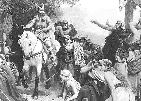
After Caesar, the Romans thought Germania was more important than the British Isles, and put it next on their to-do list, but it didn't turn out that way. The Germans had more trees to hide behind in their Black Forest, which wasn't open country like the vineyard, cereal, and sheep country of Gaul, and could ambush Roman armies and massacre them, and in 9 C.E. a Germanic chieftain named Battle of Teutoburg (Teutoburger) Forest (Wald) (German for "army man", later becoming Herman) set up and wiped out an entire army of the cream of the Roman legions in the Teutoburger Forest near Cologne, freaking the Romans and making them give up and go on the defensive, marking the Rhine River as their final frontier and setting up limes, meaning frontier defenses, like the Great Wall of China but more Roman-style (built by hundreds or thousands of slaves, not millions), mainly forts and those cool Roman roads, the best designed ever, which became the fastest way to travel in Europe until the advent of the railroad in the 1800s, and many of which are still in working condition, such as Fleet Street in London.
The limes on the Rhine and Danube worked for 400 years (300 at least), holding back the barbarians, who staged surprise invasions once in awhile, only to find the entire empire alerted by their version of the Pony Express, and Roman legions sent on the double-quick to shore up the breach and kick their butts, killing, enslaving or chasing them back. But this whole mentality proved to be their Achilles heel, as all defenses eventually fall to the offense, look at the Maginot Line in WWII, and finally resulted in the Germans overwhelming and destroying them bigtime to get even for their many grudges. If only the Romans hadn't proved to have a chicken bone, and gone on and wiped out all the Germans and set up a Roman province of Germania, we'd all be speaking Latin today. Go figure. Or maybe it was just a lazy bone, since they had so much wealth already, and the temptation to lay up the armor and get into the togas and party must have been humongous, especially with some of them blonde-blue German slave babes from the last incursion.
But I am digressing. Give the dog his food. Back to the Celts. Maybe the Germans would have wiped out the Celts if the Romans hadn't done it first. Nah, I think not. They'd already had plenty of chances, and the Celts could hold their own against them. It was the organizational skills of the blue collar worker Roman soldiers that made them too much for the Celts to handle. Both Celts and Germans could take a Roman on one-on-one, but in a battle the ability of the Roman soldiers to take orders and act as one allowed them to divide and conquer the wild men and finally massacre them after they broke ranks and fled. After all, amateur farmers are no match for full-time paid professionals who play all sixty minutes of every game and are in it totally for the money. Ask the Denver Broncos why it took almost 40 years to win a Super Bowl.
Today we have racism like between Anglos and Mexicans in the U.S., where skin color is used as a badge of superiority or inferiority. Back then, the olive-skinned Romans were actually less white than the Germans and Celts, forget blonde hair, so their badge of superiority was their clean shaven faces and sweet asses that were clean enough to eat of off. No joke, in Rome they diverted rivers into the city via giant aqueducts, and all Romans liked to lounge around all day bathing in public baths, showing off their sausages. When they went to the bathroom, they had toilet seats carved in the rocks over the exits of the aqueducts, which they called cloaca (which now is the name for your personal toilet exits), and they would just sit down and tinkle and plop, all unisex, no separate men's and women's sections (now you know why togas and robes can be convenient), after which they'd wipe their asses with a sponge on a stick, which they could swish in the water, and do over and over again until their asses were clean enough to guess what? Sometimes I think this fashion should make a comeback, so if you're into plastics how about test-marketing Roman Wipes and quote me as your source? At the exits they had fountains where slaves would hand you a perfumed towel, yes.




Even though sweet cheeks Caesar was murdered, the Romans kept coming over the Channel, but it was over 90 years before Roman general (later emperor) Vespasian (10-79) finally captured the last major chieftain Caractacus (Caradoc) (-54) in 43 C.E., and declared that they owned the island, calling it the Roman province of Britannia, striking coins with a cool picture of her, then fighting their way farther up shit river and finding a wooden bridge across the Thames River (originally the Tamesis, from the Gaelic word for dark), building a fort there known as Londinium (Gaelic for stronghold on the lake) in 50 C.E. It's kind of grown since then, chuckle. By the way, old Roman coins were struck in such giant amounts that it's quite cheap to own one today, which is why I always carry my Roman coin with the image of goddess Fortuna (Fortune) in my wallet, so somebody can ask me if that's my lucky Roman coin in my pocket or am I just happy to see them.


After taking Caractacus to Rome for a big parade, which they called a triumph, they apparently pardoned him, and he lasted until 54, the life of the party. Show us that trick or treat thingie again, and pass the wine? The various tribes lost their identities as the stragglers fled to the west and north, becoming known as the Rebels, Slaves, or Foreigners, i.e., the Welsh. Not necessarily Welshmen like Tom Jones (1940-) and Richard Burton (1925-84), though. There was an independent group in Wales known as the Silures, who were known for dark curly hair and sex appeal. Too bad the clannish Celts combined together against the common invader only after it was too late.

In 60 C.E. Iceni King Prasutagus dies, and although he leaves his kingdom jointly to his two daughters and the Roman emperor in his will, the Romans don't recognize squats, er, women as heirs and seize his territory as if already theirs, scourge Iceni regent-queen Boudicca (30-62) (Gaelic word for "victory"), a 6-ft.-tall red-haired Celt babe with bodacious tatas (or should have been) (who could kick everybody's butt and was the original Ice Queen way before C.S. Lewis stole it for his Narnia series) and rape her daughters, and try to enslave her people, calling in the ex-king's large outstanding loans (he had lived like a, er, king), confiscating lands and enslaving nobles, causing her to go nonlinear and vow to kick every Roman butt out of the island, gathering a large army of eager Celts, incl. the Iceni and Trinovantes of the Londinium area, drawing inspiration from the example of Arminius of the Cherusci, picking the direction of attack by releasing a hare and invoking British goddess of victory Andraste; meanwhile the Romans appoint Catus Decianus as procurator of Roman Britain, and his "rapacity" (Tacitus) fans the flames; meanwhile in an attempt to break the power of the Celtic Druids, the Romans under Gen. Gaius Suetonius Paulinus invade the Isle of Angelesey (Mons) in Wales, destroying their shrine and sacred groves; after hearing of Boudicca's revolt, they withdraw before consolidating their conquest.
In 61 while Roman gov. of Britain Gaius Suetonius Paulinus is off campaigning on Druid stronghold Mona (Anglesey Island) in N Wales, red-haired bodacious Iceni queen Boudicca destroys the Roman colony of Camulodunum (Colchester) (former Trinovanti capital) and its hated temple to emperor Claudius after sieging it for two days, and routs Quintus Petillius Cerialis and his Roman legion IX Hispana sent to relive it, with only Cerialis and a few cavalry escaping, during which time Suetonius returns along Watling St. and decides to evacuate Londinium, allowing the madass Celts to burn it to the ground, followed by Veralamium (St. Albans), killing a total of 70K-80K Romans in the three cities, taking no prisoners and enjoying impaling noblewomen on spikes with their breasts sewn to their mouths while they hold parties and sacrifice to Andraste.
Too bad, amateurs are no match for seasoned pros, and the Romans won it before it started, since they had the better players and coaches, and everybody was trained for years to work as one, instantly obeying orders to focus their offense or defense on the biggest Celt on the field, dispose of him, then go after the next biggest, etc., until the rest lost their nerve.
In ya face, nyanyanyanya? In 62 after inviting the old and the young to watch the coming massacre in a ring of wagons at the edge of the battle, Queen Boudicca's army of 100K-230K Celtic Britons shows what amateur hillbilly rednecks they are when they are instead massacred by a regrouped (in the West Midlands) prof. Roman army of 10K (the XIV Gemina and XX Valeria Victrix legions, but not Legio II Augusta of Poenius Postumus, who ignores his call) under gov. Gaius Suetonius Paulinus at the Battle of Watling St. (High Cross, Leicestershire?) (Manduessedum near modern-day Atherstone, Warwickshire?), where the Romans line up in front of a wood and force the Celts to send wave after wave into volleys of heavy javelins (pila), after which they form a wedge and rush them, causing the Celts to flee and get hung up on the wagons, allowing the Romans to slaughter them, killing 80K Celts vs. 400 Romans, and capturing the rest, after which Big Babe Bo freaks and takes poison; coward Postumus falls on his sword when he hears of the Roman V; Nero gets the good news after planning to withdraw all Roman forces from the island, and Londinium is quickly rebuilt by the Romans; Gaius Julius Alpinus Classicianus (-65) replaces Catus Decianus (who fled to Gaul) as procurator of Britain (until 65), and he sends Nero a message that Suetonius' punitive policies might reignite the revolt, causing him to relieve Suetonius on trumped-up charges of losing some ships, and replace him with consul Publius Petronius Turpilianus (-68) (who quit in the middle of last year) as Roman gov. #6 of Britain (until 63), who tries to conciliate the natives - women drivers, hmmph?
After this, the Celts never put up a serious challenge to the Romans in Britain again, going into survival mode with a serious inferiority complex.
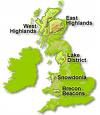
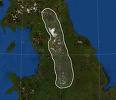



The bad times then start for the remaining Celts of the Isles. The poor Britons who weren't killed or fled to the safety of the Pennine Mountains in the mainland (the backbone of the British island, named probably by the Romans after the Apennines, the backbone of the Italian peninsula), the Cambrian Mountains in Wales (highest peak Aran Mawddwy, 2970 ft.) (pronounced "AIR-un MOTH-wee"), home of the Cambrian Explosion of British geologist Adam Sedgwick (1785-1873) (who dug up trilobites and kept one in his pocket so people could ask him if that was a trilobite in his pocket or was he just happy to see them?), or the Grampian Mountains/Hills, AKA the Highlands of Scotland (running NE to SW, highest peak Ben Nevis, 4406 ft.), or Ireland were treated like dogs, turned into serfs, forced into the Roman army to fight their brothers, and forced to raise half-Roman bastards after their wives were raped.


To digress a moment, sadly, this is the genesis of the Englishman, and the reason England eventually evolved into high-tech New Wave Romans with seagoing starships captained by Horatio Hornblowers trying to set up a world empire for their English emperor, even Christianity not being able to stop them as they told the pope to stuff it and set up their own church with their big-appetite king (food and sex both) Henry VIII (1491-1547) as their pope. Henry, by the way, was a Welshman, and claimed descent from King Arthur, until he broke with the Roman Catholic Church and had all the Catholic churches and monasteries looted, and had the bones of Arthur and Guinevere in Glastonbury Abbey destroyed in 1516, the big spoilsport. He had just kicked the Scotts' butts and killed their king James IV (1473-1513) in the Battle of Flodden Field on Sept. 9, 1513, so that makes him a neo Celt turncoat?


After a few decades Rome decided to take the battle to the Picts, who had formed a tribal confederation under chieftain Calgacus (Galgacus) (-84) (Gaelic for swordsman), and the new Roman governor of Britannia, Gnaeus Julius Agricola (40-93) chases them around until he catches them, then kicks their dangly butts at the Battle of Mons Graupius in the Highlands of E Scotland in 84, which is why they began calling the Highlands the Grampians. As usual, the Picts lost a ton of men, 10 thousand, including Calgacus, while the Romans hardly scratched a kneecap. Lucky for the Picts, just when Agricola was about to come in for the kill, he was inexplicably recalled to Rome, probably from jealousy and fear that he was becoming a new Caesar.
Back to Ireland. By the 1st cent. C.E. Ireland (Hibernia) (Juverna) (Ierne) was divided into the Five Fifths (Cuig Cuigi): Connaught (Connacht) (W) (the Wild Wild West, home of Connaugh Eastwood?), North Leinster or Meath (Midhe) (NE), South Leinster (Laigin) (SE), Munster (Muma) (S), and Ulster (Ulaid) (N) (land of the Goidels), each with its own king, all subject to the ard-ri (monarch) in the C district of Meath, who resided in Tara; the laws were dispensed by brehons, who are endowed with lands and privileges.


Up until 120 C.E., there were still true blue (skinned) Celts hiding in the Pennines, coming down from time to time to raid the Roman Gone with the Wind slave labor plantations and towns, until emperor Hadrian (75-138) personally led his legions up there and kicked them out, then tried to expel them from the Grampians, but found out what guerrilla war is all about, and after growing tired of the wild goose chase he basically said fork all them pesky wild men, let's just wall off the whole damn peninsula, and ordered the building of Hadrian's Wall, a Roman lime which still stands, although a lot of the stones have been stolen for building purposes so that it looks more like a garden wall.


One funny thing. Hadrian was the first Roman emperor to wear a beard, which makes him the Abe Lincoln (1809-65) of the Romans. So, whereas up till then Romans would feel superior to Celts because they were clean-shaven and had cleaner asses, here comes this emperor-god that's just as woolly as them, kind of a psychological victory. He was bi too, and had a cute blond boyfriend named Antonius (Antinoos), who died in his pump, er, prime, causing him to have the city of Antinopolis built to honor him as a new god. Not that he was a whimp. He almost always won, and was the one who exterminated the Jews from Judea, and renamed it Palestine (Phoenicia, land of the Philistines), beginning the Diaspora, and setting the world up for Armageddon. Why do Abe Lincolns always do that? Ever after, Jews not only hated Hadrian's guts bigtime, but would use his name in their hit movies for the Devil, for instance, baby Adrian the Antichrist in Rosemary's Baby (1968).
Not that the wall was all bad. We're not talking about Berlin here. While the wall kept the pesky Picts out of Roman Britain, it worked both ways, and saved their culture and language, kind of like a game preserve, sweet home Alabama, lord you know I'm coming home to you. It worked well, keeping the Celts intact, at least in the highlands, up until modern times. Meanwhile, they could always hope that the Romans would just give up and go back to the Continent, where like a big dike springing one leak after another, they were beginning to run out of fingers, beating back one German invasion after another.

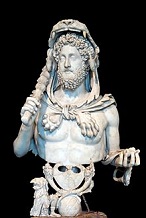


The Roman empire peaked with Stoic philosopher emperor Marcus Aurelius (121-80). The moment he croaked in Vienna, the empire started going down the commode, beginning with his son Commodus (161-92) (who liked to play gladiator, dressing up in a lion skin robe and swinging a club to mimic Hercules, as misplayed by Joaquin Phoenix in the year 2000 flick Gladiator), followed by a long line of worthless emperors, including teenyboppers like Sun (Helios) god-worshiping Elagabalus (Heliogabalus) (203-22), who became emperor at age 15, then lasted all of four years, his successor being a new low of 14.

The limes became completely ineffective by 260, causing the empire to go into a siege mentality, with each town developing its own walled defenses, throwing the poor farmers into their arms for protection, the early beginnings of feudalism. The first strong emperor after Marcus Aurelius was Diocletian (245-313), who took over in 284, then in 293 diocleted, er, divided the empire administratively into western and eastern parts, each with its own Caesar or vice-emperor (the emperor taking the title of Augustus), which may have been necessary but ultimately proved fatal when the two parts stopped being friends. Diocletian began one of the more vigorous Christian persecutions, try Bayer Back and Body.
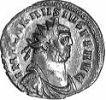
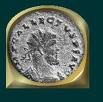
The first sign that the Romans weren't going to hold Britain forever came in 286, when a German named Carausius (-293) who had joined the Romans and worked his way up to fleet commander in Gaul got caught stealing loot, fled for Britain with his fleet and seized it, then declared himself emperor of Britannia for seven years before being killed by his own minister Alectus (-296), whom the Romans killed in 296, taking Britannia back. Not that the Picts cared, right? And not a peep from all the British thinkers, scholars, and journalists, all zero point one of them.
Why do I call them Picts and not Scots? Actually, the history of Scotland doesn't really begin until the 6th century C.E. You see, it wasn't called Scotland yet. It was called Caledonia or Pictland. The Scottish complication arose from the rise of Christianity. Let me explain.




After his predecessors tried to stomp out the Christian cockroaches 10 separate times in vain, 41-year-old blood-soaked pagan emperor Constantine the Great (271-337) got wise like a fox and supposedly converted to Christianity himself in 312 C.E., complete with his own personal visit from Christ like he heard St. Paul had, then legalized this formerly criminal cult of resilient pacifist dropout enemies of the state so he could slap some weapons in their hands and march them out under the banner of the cross, thinking that since the cross is also a pretty universal pagan symbol, and the Roman empire is tolerant of everybody, now nobody can avoid the draft and not kill at his orders. Not that is, unless you are in the Christian clergy, now government-funded, with him holding the purse strings. He even claimed hearing a soundbyte from Christ, "In hoc signo vinces", meaning "In this sign you shall conquer", initials IHS, conveniently a contraction of the Greek spelling of Jesus, also the initials of Iesus Hominum Salvator, that is, Jesus, Savior of Men, where do I sign, when is the next boot camp, shave my head? Too bad, instead of this political move of buying the Church off saving the Roman empire from a rather small (20%?) but pesky minority of love hippies who were causing everybody to become slackers by their example, the wise-like-a-fox Christian bishops on his dole joined the world Catholic style and did a number on him, demanding the total destruction of paganism, and just as bad, immediately schismed among themselves on the crypto-pagan doctrine of the Trinity into Athanasians (pro) and Arians (anti), the two warring parties led by Alexandrian bishops Athanasius (296-373) and Arius (350-336). It would have to be Alexandrian, wouldn't it, since that was the home of the Alexandrian Library, the last reservoir of ancient learning, not only on religion but science, history, grammar, rhetoric and literature, and their war would result in it being destroyed, and its head librarian, the ultimate brain babe of the Roman empire Hypatia (370-415), a brilliant learned pagan hideously murdered in her prime.

But that was a century later. In Constantine's day the Arians and Athanasians started it up, becoming bitter, irreconcilable, lethal enemies, tearing the Roman empire apart in a religious civil war while simultaneously persecuting and looting the disenfranchised majority Roman pagans, all of which was finally resolved (after the Arians lost) by giving the remaining cowering pagans an easy out around 378 by letting them join the Church while carrying their most cherished pagan idols and practices in with them in a Christian dress, as long as they subscribed to the Trinity-backing Nicene Creed (confirming the Arians' sour grapes suspicions about the Athanasian Trinity-boppers really being crypto-pagans all along), so that by the end of the 300s (392 to be exact) un-Catholic paganism was completely outlawed like Christianity had once been, only worse, by certified PC emperor Theodosius I (346-95) (Greek for gift of God), and the monolithic state-church power bloc created a happy family where every Roman was a good member of the Catholic (meaning Universal Carry-All) Church, in other words, a good safe orthodox or straight hypocrite, the mountains filling with music. At the same time the Greek side of the empire based in Constantinople began to bug out, its emperor and chief bishop going solo, never to return to the fold, which was the beginning of the you-say-goodbye-I-say-hello icon-loving Greek Orthodox Church. Not that this whole scene was all bad. After all, there were still plenty of pagans around, inside the empire and out, and there's not much good you can say about superstitious morons who worship trees, think the Sun is the creator of the Universe, and engage in human sacrifice. At least once they become a member of the Christian church, they might develop a tiny bit of conscience, between military tours of duty. Nine months for a health care career, I'd love a health care career.


The pope then became the Donald, squirrel-do optional, developing New and Old Rome into a resort hotel and office park paradise while beginning a systematic transformation from a mere head bishop of faithful worshipers of Christ, struggling under persecution from day to day as they wait for the world to end and him to return, into the state-funded awe-inspiring I-hope-it-never-ends glorious vicar of Christ, an infallible vice-god who is not only a partaker of the divine nature, but a combo between an Egyptian pharaoh sitting in a chair carried by eunuchs, a Roman augur carrying the crozier or lituus which they used to point at the heavens with before making predictions, and the high priest of Babylon wearing a two-horned fish head miter and fish-tailed cloak like Dagon the fish-god, ruling over a college of cardinals, meaning hinges, like the two-faced pagan god Janus, the opener-shutter god of gods, yada yada yada. The game of Clap On Clap Off (the Clapper) now began to incorporate every time-honored pagan practice and belief into the Church after laundering it into the new cover story (kind of like when they switched PC programs from Microsoft DOS to Windows, knowing that DOS is there still underneath and will never be as good as the Apple Macintosh), all the while remaining Romans beneath the toga, with their powerful military singing new camp songs, which are really the old camp songs, like the ones they sung at the real Christ's funny fashion-passion show. In comparison to all that crap, the little bitty Trinity ain't nuttin', bring me another Christ and I'll crucify him myself? Who wants to go to the park? Me? Who wants to eat broccoli? Me?
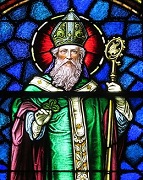

Time to make a change, changes everywhere? That didn't stop Arianism from spreading where the Church couldn't reach, and, bad news, their future conquerors the Germanic Goths went Arian, converted by Bishop Ulfilas (311-81), as well as a bunch of former Druids in Ireland, who kept things interesting for centuries, while the Egyptians never really went with either program, creating Coptic Christianity, and the Arabs to the left of them we won't even mention, you know what they came up with later. Meanwhile the Jews, about all they could do was find a place to hide. But the Church was no slouch, and even as the Roman Empire was on its last legs, Roman monk St. Patrick (385-461) was sent by the pope to Ireland, and he used the 3-leaf clover (shamrock) as a sales tool from God to win the Irish over (hi, I'm Mister Opportunity, I'm here, and I'm knocking?), allegedly baptizing as many as one hundred thousand before dying an instant saint on catholic dot com. One clan he converted was known as the Scots. The Who?
Meanwhile back in mainland Britain, the Romans had left in the early 400s because of the German menace on the Continent, evacuating Londinium and all the other Romanized towns in 409, allowing the still mainly Druidic Celts to come out of their hiding places and rejoice that they had their island back, and hold rock concerts at Stonehenge. But that only lasted a few decades, because the Germans, also pagans, soon invaded and filled the vaccum. However, this time the Celts were more of a match for these tribal people, and it took until the late 500s for the Germans to drive them back to their former hiding places, splitting the former Roman lands up into Angle, Saxon and Jute mini-kingdoms, all pagan, worshiping their own sacred trees and their god Woden seven days a week and twice on Wednesday.


Meanwhile the reeling Romans not only had to worry about the pagan Germanic Ostrogoths, originally from Gothland (an island near Sweden in the Baltic, the biggest island actually), led by Radagaisus (350-406), who invaded Italy in 401 and caused them a lot of grief, but their brothers the Germanic Vandals, who broke over the Rhine limes in 406 while the Romans were busy in Italy, and sacked Gaul, ending up in Spain. As if they weren't already running out of bandages, here come the Germanic Visigoths, led by Alaric I (370-410) (German for ruler of all), who took away their last illusion by sacking Rome itself in 410, then chased the piratical (but cultured?) Vandals into North Africa, where they took over Carthage, killing St. Augustine of Hippo (354-430) (author of The City of God) in the process, then learned how to sail ships and came back to finish the job and vandalize the city of Rome in 455.
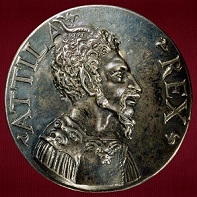

And that was about all that was left of the Western Roman Empire after the far more horrible civilization-hating Hun hordes, led by mean swarthy horseback-riding pagan polytheist polygamist midget Attila the Hung, er, Attila the Hun (406-53) (Attila meaning little, er, father) invaded Gaul in 451 with 700 or 800 thousand horsemen looking for love, and took a giant chunk out of them before the warring Visigoths and Romans decided to unite for once and take care of them before going back to war with each other, allowing them to regroup and invade and sack Italy in 452. One bright spot, the Huns unaccountably swerved around Paris, causing the Christians to claim that the city was saved by the prayers of a babe named St. Genevieve (422-512). The Huns are coming, you don't have to work about cervical cancer, whoopeedoo.
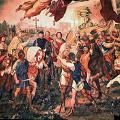
The Huns were bad, but had their weaknesses, one of them being superstition, so when they were at the gates of Rome, out pops Pope Leo I the Great (-461), who pulls out his jive talkin' crackalackin' mamajama and talks him out of capturing it (in exchange for a box of treasure), after which he returns to his stomping grounds of Hungary (get it?), then suddenly dies one night in 453 while breaking in his zillionth wife, after which his leaderless hordes were made short work of, although everybody from anywhere near central Europe later claims descent from him.


By now there just wasn't much life left in the Roman bleeding body. After a couple of decades of who knows what, where the doomed passengers descend to total hedonism as their Titanic ship slow sinks, the dying nerve center city of Rome finally fell in 476 to everything-I-want-in-a-Goth-service Visigoth chieftain Odoacer (Odovacer) (435-93), who told boy emperor Romulus Augustus (461-77) to just run along and play, and the Arian Visigoths and Vandals split the defunct Catholic Western Roman Empire into separate kingdoms of Italy, Gaul, Spain and North Africa, causing the poor pope to find himself surrounded in a sea of armed half-barbarian heretics, freaking him out and turning him into his own mayor of Rome, complete with his own army, which the popes systematically extended into the Papal States.


But don't count him out, this was not just any pope. This was Pope Leo the Great, and as the world fell around his ears he became the de facto new Roman emperor, and had if anything a bigger bag of tricks, juiced by priestly voodoo. First there were the Byzantines, brother Christians, yes, heretics as far as the pope was concerned (not necessarily the Arian thingie with them, but other problems with how a man could be God, and whether he had one divine nature, or a divine nature that warred with a human nature, as if anybody cares?), but at least on speaking terms, although only to be trusted so far. Indeed, it was the Byzantine Emperor Zeno (426-91) who had let Rome fall while he had his rooms painted and his nails done, then waited until the dust cleared and sent the Ostrogoths (who were nominally his friends, but were really leaching off him as they camped around Constantiople) to kick the Visigoths out of Italy and take over, thinking that would save him a lot of money and also put him in charge as the emperor of the whole shebang, only to find out that their chieftain Theodoric the Great (454-526) (Theodoric being Goth for ruler of the people) wasn't that dumb, and wanted to go solo, leaving Zeno with the choice of sending his own troops to knock him off or forget it.

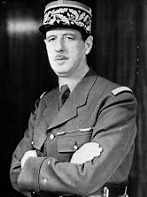
Meanwhile the pope was busy sending missionaries across the Rhine to the Germans, and finally hit pay dirt with Clovis I (466-511), who was converted by St. Genevieve in 496, and led his confederation of Christian Trinitarian Germans called the Franks (freemen) on a victory tour against the pesky Arian Visigoths in Gaul, enjoying fifth column help from downtrodden Catholic Romans and the pope, finally bloodily kicking the Visigoths out in 507, leaving them only Spain and North Africa, which served them right, as only true Trinitarians get three. Gaul then became France, with Clovis (don't say Charles) in charge, later so much admired by all Frenchies including Charles de Gaulle (1890-1970 (de what?). Actually, his name was more like Clodwig or Ludwig, as the French language didn't exist yet, but as the German and Latin tongues merged, and the sports of raw oyster eating and French kissing picked up steam, the language took over in a few centuries, and Clovis became Louis (loo-ee), a name which 16 French kings ended up adopting until the last one lost his head in 1793 and jinxed it.



But we're talking about the Scots, so I'll stop digressing. The Germans took over Britain, but they couldn't finish the job the Romans started and exterminate the Celts, because just when things looked darkest, and they were about to wink out, a hero arose, a great king, who kicked the Saxons' butts around the year 500 in the epic Battle of Mons Badonicus (Badon Hill), making West England (Cornwall and Wales) safe for Celts for 50 years during the Golden Age of Camelot, a lot near the village of Queen's Camel in Somerset. That was King Arthur (-537), a real king. His chief druid Merlin was misnamed by Sir Thomas Malory (1405-71) in his Morte d'Arthur (published posthumously in 1485), because at this late date he was so mixed up that he thought the Druidic Celtic king Arthur, whose name in Gaelic means rock or hard, was a Christian king living in France, with a name based on Greek Arcturus, which means bear, and that the name Merlin came from Latin for hawk, when actually it was Mervyn (Myrddin the way they spell it in Welsh), meaning sea tower or lighthouse in Gaelic. The name of Arthur's babe Guinevere means soft and white in Gaelic, which makes sense every night, get it? Come here, baby, and let me put my hard rock in your soft and white. Even dirty is beautiful and poetic in Gaelic, which is the most beautiful language in ancient Europe. There isn't an ugly word in it. And it would still would be, if it hadn't gotten corrupted and fragmented by other languages. The reason French is so beautiful is its absorption of 100 Gaelic words, and even English has a large load, well, not really, the Saxons considered the Welsh inferior, and surged back and swamped them out after the 50-year Age of Camelot, and despite centuries of contact, living side-by-side, only absorbed 10 Gaelic words into English, which is too bad, since in Gaelic even bad babes sound good, like Morgana (Gael. "edge of the sea"), Arthur's evil Druid fairy half-sister. I'd like some Gwina in the evening and some Morgana in the morning, wouldn't you? Compare with guttural German, the ugliest language in Europe. It doesn't have a single beautiful word. The whole German lingo sounds like dirty talk you would hear in the back alley of a sailor's whorehouse. Who'd want to marry a Gretel, for instance, when they could have a Gwina or a Morgana, unless it was for a cheap quickie? How do they say I love you in German? "Ich liebe dich". Just imagine the tenderness of the scene, way back east of the Rhine: "Ich liebe dich, Hansel". "You want to lick my dick, Gretel?" "Jah, Hansel, I want to lick your dick." "Well okay, but save some for later, will ya?" What a difference the Rhine River makes, eh? Go Hitler. Funny, the French claim that St. Genevieve's name means white wave. Sounds like a coverup.

Okay, I digressed again. Now I'll try to control myself. Europe and the British Isles now entered the Dark Ages, and that means that the history is dark, and who knows what great comic books we missed. Under a barrage of enthusiastic Irish Roman Catholic missionaries, slowly the German kingdoms in England converted to Christianity, and swallowed each other up in an inevitable amalgamation, while the poor Celts tried to hold on in the waste spaces of the British Isles, mainly the north and west, and Ireland. By the end of the 800s the Christianized Roman Catholic Saxons won the power struggle, and when Alfred the Great (849-99) (Alfred means wise elf counselor) died in 899 there was a single Anglo-Saxon Christian kingdom, all Trinitarian, the Arians all-but kaput there and in the Continent, come on and sing it with me.

Not that the Arians were pushovers. They scored an early victory in Caledonia, sending St. Columba of Iona (521-97) to convert the Picts around 565 C.E., which apparently pissed-off the Irish Trinitarian tribe of Scots, causing them to migrate over the Irish Sea to west Scotland, shamrocks in hand, landing in that funky group of isles there, and founding the kingdom of Dalriada, becoming enemies of the Arian Picts for centuries. Lucky for the Trinitarians, the big Millennial Fever year of 666 caused a union of the Celtic Christians in Northumberland with the English Christians and Rome, just in case, you can understand, but Pictland over the Wall stayed Arian, like Black Water by the Doobie Brothers.
Despite setbacks in Pictland, the Irish Roman Catholics invaded Britain and the Continent with missionaries, those who still weren't pagan pirates that is. "In each country Christianity took on the qualities of the national temperament. In Ireland it became mystic, sentimental, individualistic, passionate; it adopted the fairies, the poetry, the wild and tender imagination of the Celt; the priests inherited the magic powers of the Druids and the myths of the bards; and the tribal organization favored a centrifugal looseness in the structure of the Church - almost every locality had an independent 'bishop'. As Germanic invasions of Gaul and Britain had driven scholars from those lands to Ireland, so now the wave returned, the debt was paid; Irish missionaries flung themselves upon the victorious pagan Angles, Saxons, Norwegians, and Danes in England, and upon the illiterate and half-barbarous Christians of Gaul and Germany, with the Bible in one hand and classic manuscripts in the other, and for a time it seemed that the Celts would win back through Christianity the lands they had lost to force." - Will Durant, The Age of Faith, Ch. 21.


Enter the pesky Vikings, who started invading Britain in 793 C.E. in their long ships, followed by Scotland in 794, and Ireland in 795, and got so bad that they caused the Scots to begin celebrating Hogmanay on New Year's Day, which commemorates the need to sneak a peak at the hair color of the man at the door before opening, welcoming them if red or brown, running like hell if blonde. Celtafed PE, get your head back where it belongs? Too bad, many monasteries were destroyed by the Vikings, including their historical materials on the Celts, plaguing us today.



The blond Vikings liked a wee bit of red-haired ussy, and today there isn't much pure Celtic blood left, and the Gaelic language has splintered and absorbed foreign words and grammar, not only from the Norse but from the Normans AKA English. Take Chuck Connors (1921-92), the Rifleman. He has many Irish features about him, but otherwise he's a pure blond Viking man, while his TV wife Patricia Blair (1931-) also plays an Irish woman, and has flaming red hair to prove it, but otherwise looks like a Viking woman. Chuck Connors is clean shaven, so the Celts might consider him a Roman, even though his accent means the medics must take him to the Catholic hospital. Blair also played the wife of TV's Daniel Boone, played by Fess Parker (1924-), try to figure how much Celtic blood he's got.



The Danish Vikings took over northeast England below Hadrian's Wall, and would hire out to the Picts as mercenaries to help them fight the Scots. In 836 the Scots adopted the blue and white Flag of St. Andrew (Saltire) after they made a last stand against the Northumbrians at Athelstaneford in Lothian near Haddington and killed king Athelstan after claiming to see an X-shaped white cross like St. Andrew was crucified on in the blue summer sky. Too bad, in 839 the Danes suddenly turned on the schmucky arrogant Picts and massacred them, and now the Scots had the Picts on the run, allowing Kenneth Mac Alpin (810-58) (Gaelic for "handsome son of Alp"), whose mother was a Pict (making him the perfect picture) to unite the two kingdoms, becoming king of Scotland in 843 and moving the Scottish capital from the west side to the east side of Scotland, to Edinburgh (pronounced ed-in-BUR-uh), along with the Stone of Scone (Destiny) (pronounced skoon), on which all Scottish kings are crowned. The Arians were by now kaput in Scotland, until the Jehovah's Witnesses got the idea of coming knocking in the 20th century. Actually, the Kenneth Mac Alpine story is some kind of coverup, and it took many years for the actual union to take place. By the way, the Stone of Scone allegedly traces back to Jacob's Pillow (Stone of Jacob) (Gen. Ch. 32), with the added nugget that the original Scots were Egyptians, starting out with warrior gay fellow Gaythelos, who married Pharaoh Chencres' daughter Scota, and took his tribe through the Strait of Gibraltar to Ireland along with the stone.
Luckily, by the Millennium Fever Year 1000 the pesky Vikings converted to Christianity and tamed down, and now Trinitarian Christian Scotland faced off against Trinitarian Christian England, with Trinitarian Christian Ireland off in the rear. Apparently the Scots could hold their own against the Saxons, and things looked like they would remain stable for another thousand years. Wrong.


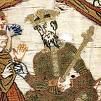

For awhile Scotland seemed to be on the way to permanent freedom, a nation of Scotties building warp drives and going for the stars. In 1034 Duncan I (1010-40) (Gaelic for "brown warrior") became king, uniting Scotland's four nuclei, which incl.d Celts in the highlands and various Germanic tribes in the lowlands, although it's like a half-cooked stew, not too digestible yet. Enter his trusty right-hand-man Macbeth (1005-57), earl of Moray and Ross in the northern tip of the island, a true Celt of the Old Skool, who defeated and killed him in 1040, and became king, and Scotland was now safe for the kilted hillbillies (don't believe Shakespeare's play, it's a Norman smear). Too bad, Duncan's young son Malcolm managed to flee, ending up under the protection of his worst nightmare, English king Edward III the Confessor (1004-66), who was of Anglo-Saxon blood but raised a Norman, causing Malcolm to imbibe their culture during his long exile before returning for a grudge match backed by Edward and kill true blue (as in vegetable dye) Celt Macbeth in 1057 and be crowned Malcolm III Canmore of Scotland (1031-93), a king of divided loyalties.

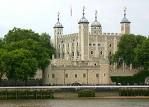
Meanwhile in 1066 the horrible French-speaking Normans, led by Duke William of Normandy took advantage of the sudden death of Edward the Confessor, got the jimmy legs and invaded England and took it from the Saxons, and William I the Conqueror (1027-87) was crowned on Christmas Day, going on to occupy England and turn the former ruling class into serfs, calling them dogs and introducing them to the eugenics program known as prima nocta, building the White Tower in London in 1078 to overawe the Saxon dogs with his might.

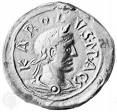
The funny thing about the haughty Normans, who liked to browbeat other peoples with the superiority of their French culture (the only "true" Christian one, since it was the Franks who saved and forever backed up the papacy since 492), is that they weren't really French, but politically correct Vikings, who invaded France in 911 and were bought off to keep Paris from being sacked by giving them the bad side of France as a present, allowing them to form the Duchy of the Northmen (Normandy) as long as they kept other Vikings out, went Christian, and learned to speak Frog Talk (French). The first duke of Normany was Hrolf (860-932) (the Wolf?), who changed his name to the PC effeminized French name Rollo then Robert, and got a box of treasure and the daughter of the whimpy king Charles III the Simple (879-929), the epithet being added by his pissed-off nobles, who couldn't believe he sold out, and later deposed him.
Well, they absorbed the French culture, and a little too well, becoming more French than the French, adding a form of white supremacy to it, because as blond-haired blue-eyed Norse, their pale skin didn't tan easily, allowing the blood veins to show through, causing them to be known as bluebloods. They also learned horsemanship, adding it to their repertoire of long ships, creating the Norman knights, who went out all over Europe looking for adventure as mercenaries with crosses on their chests so they wouldn't be mistaken for Vikings. They took over Sicily in 1060-90, and once even sacked Rome (1084).




So now that they had their hands on England, it was just a matter of time before the Normans absorbed Wales, Ireland and Scotland, they thought. Luckily the Crusades intervened in 1095, causing English kings to prefer to spend their energies kicking Muslim butt for Christ to get the Holy Land back for a couple of centuries. Too bad, heretofore proudly independent Ireland went down around 1170 when Norman knight Richard Fitz Gilbert de Clare, 2nd Earl of Pembroke, AKA Strongbow (1130-76) and his boss Henry II (1133-89) took advantage of a civil war to play both sides against the middle and enslave them all, causing Ireland to gain the name of the Land of Ire, the poor Irish being treated like mongrel dogs, the techniques perfected after a century of practice. Henry II was known as the hubby of manly woman Eleanor of Aquitaine (1122-1204), who pioneered medieval women's lib as portrayed in the 1968 flick The Lion in Winter by Kate Hepburn - not really, but it was the 60s.





Sadly, the Normans didn't just leave Scotland on the back burner either. They had a systematic plan to take it over from day one, the idea being that if they couldn't conquer it with their army, they would infiltrate it, fork their way into it, white man speaks with forked tongue, marry Pocahontas, anything to ultimately absorb it. Therefore they started a program of Normanizing the Scottish nobility, weaning the nobles from the commoners by marrying them to Norman babes, who taught them Norman ways and French, making them think of themselves as more Norman than Scot, going on to treat pure Scottish commoners like dogs, just like the Normans did with the Anglo-Saxon dogs, turning them into serfs on their ever-growing slave labor plantations, er, estates. And this started on day one, since William the Conqueror's mistreatment of Anglo-Saxon caused Margaret Aetheling of Saxony to flee into the arms of Scottish king Malcolm III Canmore, the one who knocked off Macbeth, and, as Queen Margaret Aetheling of Scotland (1045-93), she Anglicized his court, which, compared to Normanizing it, might be considered good, but when they were both knocked off by William I the Conqueror's red-bearded son William II Rufus (1056-1100) in 1093, and the true blue Scots attempted a comeback with Malcolm's brother Donald Bane (Donald III) (1033-1107), who only lasted until 1097, after which Edgar I (1074-1107) became king of Scotland, and a puppet of William II Rufus, continuing on with the Anglicization program, which now was really Normanization, as proved by succeeding Scottish kings abandoning Gaelic names for uncool Norman ones, starting with Alexander I (1077-1124) (r. 1107-24) and David I (1080-1153) (r. 1124-53).
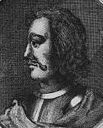

One strong king the Scots can boast of is William I the Lion (1142-1214) (actually, he was called the Garm or Rough until after his death), who adopted the Red Lion Flag and was so popular after his death that the Scottish nation adopted the flag and gave him the nickname. Too bad, by this time all Scottish kings were "Frenchmen in race, manners, language and culture", and "keep only Frenchmen in their household and following and have reduced the Scots to utter servitude".


A couple of centuries and the Crusades petered out, and enter Edward I Longshanks (1239-1307), the 6 foot 7 inch blond-haired handsome but mean and conniving British warlord so unbeloved of Scots, who became king in 1272 after his old fart daddy Henry III kicked off 54 years into his reign and he was out leading the ninth and last Crusade in Syria, hearing the news and deciding that if Christ wanted Christians to have the Holy Land they'd have it by now, so he must not care that much, and it's more important to head back and claim his throne than fight for pie in the sky. So Longshanks gave the Muslims the Holy Land as a gift, which they've kept to this day. He then went to work on Wales, taking it in 1284 after killing Welsh prince Llewelyn the Last (1223-82) (supposed to be Gaelic for "oath of Belenus", the shining one, the god of light, the henbane god, but we all know it means lion), later making his son Edward II (born in Wales that year) the first English prince of Wales, which became the permanent title for the heir to the English throne after prince of Scotland didn't work out. Sorry, I'm getting ahead of myself. The Scots were at the top of Longshanks' list all alone now, and he even called himself the Hammer of the Scots, live secure, be secure not.

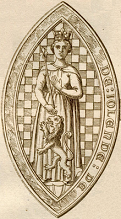

Scotland knew its days were numbered now. And wouldn't you know it, just when they didn't need it, their widower king Alexander III (1241-86), whose 19-y.-o. son and heir Prince Alexander (1264-84) died on Jan. 17, 1284, causing him to hustle and get married again to Yolande de Dreux (1263-1322) and put a bun in the oven, decides to hold a bun in the oven party one night, getting drunk and riding off to see his wife alone, only to fall off his horse on the beach and break his neck, leaving the bun in the oven as Scotland's only hope. And bad luck happens in threes, so next thing you know Queen Yolande miscarries, leaving Scotland with no heir except his 3-year-old granddaughter Margaret the Maid of Norway (1283-90), daughter of his sister Queen Margaret of Norway, who died in childbirth, missing her big chance. Not that the sexist Scots would tolerate a female squat to, er, monarch, but they would allow her to become queen under regents who arrange a suitable mate for her.


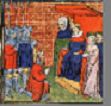
Longshanks saw his chance, and arranged to have his son Edward Jr., later Edward II (1284-1327) on July 7, 1307 betrothed to Margaret, thinking he'd just fork his way onto the Scottish throne, which might not have been that bad, but that fell through when she sailed for Scotland and got sick and died before making it, throwing Scotland back into turmoil as a dozen clans decided their man was going to be the new king, and, being Celts, couldn't agree peaceably but only after bloodshed, threatening a bloody civil war. So what's the third stroke of bad luck for Scotland? Longshanks got game, saw his chance again, and, calling himself overlord of Scotland, pretended to be the Great White Father who would stop the wild Huns from killing each other by setting up a commission to look at the genealogical charts and decide the matter with superior Norman brains. After the Scots fell for it, helped along by an English occupation army sent to help them decide, he told his puppet commissioners to pick the one who would be the biggest puppet, John (de) Baliol (Balliol) (1249-1315), who wasn't even a Scot but an Anglo-Saxon-Scot hybrid left over from the David days, and he promptly went to Newcastle to get his crown from Longshanks' hand in 1292, then marched into Scotland at the head of an English army, saying "I'm your new king", at which the Scottish nobles, who by now had been turned into half-Norman half-Scot race traitors who thought they were Normans anyway shouted "Hooray!", while the mass of commoners cried "Oh no, they're all selling us out now!", and ran for the highlands to become rebels, refusing to swear allegiance to the new King John.
So, with the approval of the Scottish king and nobles, Longshanks practically took over Scotland without firing an arrow, garrisoning Scottish castles with English troops, and recruiting barons to move into Scotland and set up forts, with English sheriffs in the towns to grind the commoners down like serfs and dogs. The commoners either had to endure being turned into serfs and having their wives' cherries popped by the Norman lord under guise of the infamous law of prima nocta (first night or first knockup), and forced to raise a half-Norman bastard who looks like their lord, or flee to the hills and become rebels, taking what farm implements they could carry, plus occasional stolen English weapons and horses, and wearing their blankets around their waists, what they call the kilt. Better to die a free man than live a slave, erin go brah. To them it would have been like black Africans forcing white Americans to have and raise their half-black half-white babies, they would rather fight than switch. William Wallace's daddy Sir Malcolm Wallace, a low ranking noble who sided with the commoners took to the hills with his young son William, and ended up getting killed by English soldiers, causing William to be raised by his uncle Argyle and sent to a monastery, where he learned Latin, French and all the high tech of his day, just in time to become the national hero, see the Gibson flick and take your dried bouquet along with three hankies.
Why did the Sir William Wallace movement have so much trouble getting going? Infighting and jealousy, i.e., the winners write the histories. In 1370-5 John Barbour (1316-95) wrote The Brus (Bruce), a 14K-line chivalric work by the archdeacon of Aberdeen about Scottish heroes Robert I the Bruce, Sir James "Black" Douglas, and the Earl of Moray fighting for their freedom from the stankin' English, starting with the 1276 death of Alexander III and ending in 1332; paid for by Robert I's grandson Robert II, becoming the favorite of England-hating Scots for cents.; the real reason at the time was to paint the Stewarts as the rightful heirs of the Bruces, and paint pesky William Wallace off the canvas?; "Fredome mays man to haiff liking" - there is no such thing as an insignificant detail?

What's so great about William Wallace then? To non-Scots, nothing. Just another wild sheep ucker who wouldn't accept the advance of ogress. To the Scots, he was their greatest hero because he almost single-handedly held Scotland back for 300 years, that is, kept them from absorption into the English empire until the Catholic-Protestant schism caused them to be thrown into England's arms, then systematically stabbed in the back, turned British and made into good engineers like Scotty on Star Trek, played by Canadian-Irish actor James Doohan (1920-2005), Erin go bragh. Too bad, from 1337-1453 the English began spreading Scotophobia, spreading disdain, fear, and hatred of the Scots, painting them as untamable barbarians.

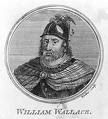
A lot of that flick was moose hockey, okay, but face it, things were getting bad for the masses of Scots, who only wished to preserve their language, customs and culture, and above all their free-ee-ee-dom, and indeed they were on the verge of winking out, until, just when things looked hopeless, a real historical hero arose, Sir William Wallace (1272-1305), and although he may not have been as cute and photogenic as Mel, and was said to be as tall as 30-year-older Longshanks but may have lacked a few hands, he was the real deal, and taught the Scots to fight for their free-ee-dom, to become guerrilla fighters that could beat the stankin' English, even if they were outnumbered three or four to one, and even if the English were far better equipped and financed. These were free men fighting to keep their ancestral lands given them by God from being stolen, their wives from being raped, and from being turned into serfs, and one free man is worth 10 trespassing mercenaries licking the boots of an emperor, right? Like the good old days of Thermopylae in 480 B.C.E., it's all about freedom. You want to take this sword out of my hand, you stankin' English, then pry it out of my cold dead fingers, the original rednecks. Here's our Scottish salute, raising our kilts and mooning you and wagging our hairy family jewels at you and farting. If you want my family jewels, come here and take them, and I'll cut yours off and stuff them in your mouth before or after I cut off your head. Play the bagpipes, erin go bragh.
To make a long story short (see the movie, then check it against the Great Track of Time), Wallace kicked their butts a couple of times, showing the Scots new battle techniques that proved that the stankin' English aren't supermen and can be beat if they stuck together. Unortunately Longshanks used the nobles to get to him, and got him betrayed and captured, then brought to London and crucified like Christ, complete with a crown of thorns in August of 1305, his tarred head displayed on a pike on London Bridge. Case closed? Not.

After receiving the news of what the stankin' English did to Wallace, half-Norman half-Scot fence-sitter Robert the Bruce (1274-1329) finally woke up, smelled the wars of the roses and declared against Longshanks, uniting the nobles and commoners, with Wallace as their martyr, and after another 10 horrible years of war he kicked the last English butt out of Scotland and won their freedom for almost 400 years at the epic Battle of Bannockburn River on midsummer's day (June 24) in 1314, becoming Scottish king Robert I, preserving the Scottish language and culture from total extinction till this day.



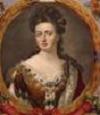






So, for 10 generations, the half-wild kilted ninnies of the north could keep from changing and preserve their lost cause, as long as they kept the Catholic surface over their Druidic innards, erin go bragh. Too bad, the Protestant-Catholic thingie started by Martin Luther (1483-1546) in 1517 (on Halloween, wouldn't you know it?), then picked up by John Calvin (1509-64) and John Knox (1505-72) caused the Scots and English to go Protestant and end up throwing in together against the Catholic French, Spanish, and Italians in horrible religious wars that only ended in 1648 with the Peace of Westphalia, but by then the Scots were at the mercy of their English Protestant summer soldier friends, so no surprise that on Apr. 16, 1746 the English finished the Highland Scots off at the Battle of Culloden Moor, the Gettysburg of Scotland, and tried to ban their entire culture, kilts, bagpipes, Gaelic and all, having already officially absorbed Scotland as a province under Queen Anne (1665-1714) (a German, and the last British monarch to veto an act of Parliament) via the Acts of Union of 1707. leading the Scots to pin their hopes on James Francis Edward Stuart, Prince of Wales (AKA the Old Pretender) (1688-1766), son of deposed James II of England (James VII of Scotland), who turned out to be a whimp, even spelling his name the English way (Stewart) when it served his purpose. Too bad for them snooty class-conscious Brits, the Celtic culture only went underground and survived. In 1740 English antiquarian William Stukeley (1687-1765) pub. Stonehenge, which links it to the Druids, helping to make them cool again, attempting to date it and coming up with 460 B.C.E., fostering a renewal of Celticism. It worked. Just listen to the cool music of Glasgow man Donovan Leitch (1946-), or see the 1996 film Trainspotting (not?).


Despite an occasional rumor of a Jacobite rebellion, and Scottish-born Sir Thomas Sean Connery (1930-), playing Englishman James Bond 007 for stupid, er, history-challenged Yanks who couldn't tell the difference and didn't care as long as he has a cute face and ass, Scotland stayed absorbed clear until the movie "Braveheart" came out in 1995, then finally gained its independence on Sept. 11, 1997, 700th anniv. of the 1297 Battle of Stirling, although by this time it didn't mean that much since most Scots had left Scotland and lived elsewhere, just like the Irish, and England had long had the stuffing knocked out of it by, guess, the Germans, in World Wars I and II, and was devolving, its "empire where the Sun never sets" shrinking yearly and the English male in a state of permanent shock, witness the Sex Pistols.
Indeed, the world has shrunk so much that now Europe is being flooded with Africans, Russians, Turks, Asians, everything, and the spirit of White is Right racism is going the way of the dinosaur, too risky, while Christian churches throughout Europe are empty except for old farts, the young people too busy attending clubs and concerts. So like Randy Jackson says, it doesn't matter what you sing as long as you really sing it, and erin go bragh that's the end of this little story.

P.S. Recently, a new queen has arisen in Scotland, Susan Margaret Boyle (1961-), who I surmise must be lineally descended from the Balliol line of Scottish kings, and therefore should be in line to become the next monarch of Scotland. Stay tuned.





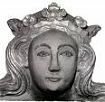

Oh yes, my graduation speech that I never gave back in May 1971. It's pure moose hockey, but Mel Gibson later stole it for his movie "Braveheart". Or maybe I did, and this is a coverup for the winner's side. Here it is.
Now that I'm graduating and we'll never see each other again, did I tell you about my great ancestor Sir William Wallace? Did you take European History? Don't look at your textbooks, he won't be in the index. The stankin' English tried to write him out of history, and he'd at the most be a footnote about some rebel who got due process of law. Who here has heard of Sir William Wallace, raise your hand. Nobody. That's too bad, because he's the number one Wallace of history. No, he's not Mike Wallace of 60 Minutes. Not George Wallace of Alabama. Not Henry Wallace the vice-president under FDR who hooked up with Norman Borlaug to launch the Green Revolution in Mexico and India. Not Wallis Warfield Simpson, who got Edward VIII to leave the English throne for her, maybe she gave a great beejay. No, Sir William Wallace, the greatest of the Wallaces, what a man, what a hero.
Sir William Wallace was the George Washington of Scotland, mixed with Spartacus. Too bad that Americans mostly don't care about history, because their ancestors were robbers, murderers, rapists, and genocide artists who stole an entire continent from its helpless inhabitants, and so to them history only begins two centuries ago, with George Washington, the father of our country, who cracked his teeth eating walnuts and got a pair of dentures made from hippo ivory that didn't fit, causing his mouth to sink in like on the one dollar bill. He was the head of our nation, because he had the biggest dick in Virginia, and wore it down the left leg, he was a left legger, they didn't wear underwear then, and horses proudly displayed theirs all the time, so it was the fashion to wear tight riding breeches and shove it down either the right or left leg.
He called himself a surveyor, which was the term then for a bum, who went from town to town eating mulligan stew and surveying for a handout. He was of aristocratic lineage, and when the French and Indian War broke out he finally got a real job and became an officer, but was a total fuckup, losing every battle. He read the Bible regularly, and after meeting the most beautiful babe in Virginia, Martha Custis, who married the richest man in Virginia, Mr. Custis, he did the David-Uzziah-Bathsheba trick and got him killed in battle, then moved in on her, and after one poke from that horse dick she was singing Wagner and saying I do. He then went from a bum to a planter, the richest man in Virginia, the richest and most populous colony in America. But like with everything else, he was a fuckup at that too, and grew tobacco that nobody would buy.
Luckily he was great at self-promotion, and when 1775 rolled around he rode into Philly on a white horse with a bunch of his men, saying I'm your man, make me commander in chief, I work for free, how could they say no. He then lost every battle he fought, losing Brooklyn and New York City and run over the Hudson River to New Jersey, and losing that, ending up in shitty Valley Forge, Pennsylvania, where his men starved and froze with no shoes, and were all about to quit when their enlistments ran out on Dec. 31, 1776. He was more into disciplining the troops than fighting, fining them for swearing and forcing them pray like he did three times a day on his knees with a Bible on the chair, unsuccessfully petitioning Congress to raise the number of lashes he could give them, who didn't hate the rich bum's guts.
Just then he had the one good idea of his life, knowing that the Germans practically invented Christmas, Kris Kringle and all, and liked to get drunk as skunks, so he forced his men to row him over the freezing Delaware River at night and surprise-attack the Hessians at Trenton, New Jersey, winning a big V and capturing their weapons and supplies, causing his men to reenlist, saving the war. It took several more years, and if the French hadn't entered on his side they never would have won, but after the French fleet bottled the English up at Yorktown while Washington led a siege, he finally got Cornwallis to surrender and was unanimously elected our first president, and his portrait now graces every one dollar bill, you can even see his old wrinkled dick if you know how, ask me after I'm done.
So, Washington was two centuries ago. How many centuries ago do you think the George Washington of Scotland was? Guess. Okay, I'll tell you. Seven. The late 12th century. So let's go back seven centuries. There once was this evil Norman king named Longshanks, who led the 9th and last Crusade and knew that it was all over in the Holy Land, leaving him free to finish exterminating the Welsh and Scots and make their lands into new provinces for Norman English settlers. He took care of the Welsh first, finishing them off in 1283, and later making his son Edward Jr. (Edward II) the first English Prince of Wales. The Scots, who had maintained their independence since Noah's Ark and the Tower of Babel, fighting off the Romans and Saxons knew that they were next, and were getting nervous.
Meanwhile in Jan. 1984, er, 1284 widowed Scottish king Alexander III lost his only son and heir Prince Alexander, forcing him to get a new wife Yolande and pork her instead of spending the nights in the nunnery porking nuns and swigging wine. After finally getting her pregnant, he held a drunken all-night party in Fife in 1286, and insisted on setting off alone to see his wife in her castle, being found the next morning with a broken neck on the beach after his horse threw him. Scotland's future now depended on her bun in the oven, and she put up a good act with a pillow strapped to her waist, but the people finally figured out that she miscarried, throwing Scotland into confusion as the chiefs of the clans came forward to claim the throne, Claymores strapped to their backs.
The closest living relative was Alexander's 3-y.-o. granddaughter Margaret, the Maid of Norway. Longshanks saw his chance, getting her betrothed to his son Edward II, so that he could absorb Scotland when he grew up. Too bad, the babe died in the Orkneys en route to Scotland, and never saw it, throwing Scotland back into anarchy and near civil war. This gave Longshanks his greatest chance, and he claimed to be the overlord of Scotland who was superior to them and of course wiser, and was forced to intervene to keep the Scots from killing each other, setting up a royal commission to decide the claims without bloodshed. Of course he packed it with puppets who would let him make the real decision, so no surprise they picked Anglo-Saxon Norman whimp John Balliol to be king of Scotland, and after he personally crowned him and made him swear fealty to Scotland, meaning that Longshanks owns it and he's just the caretaker, he led a Norman army into Scotland, saying "Hi, I'm your king." The Scottish nobility, who by now were half-Norman anyway, cheered, while the commoners groaned, and many fled to the hills and became rebels. The Scots called Balliol Toom Tabard, meaning Empty Coat, it's a long story, I'll skip it.
One of the rebels was Sir Malcolm Wallace, a low-ranking noble protected by the Stuarts in west Scotland, home of Glasgow and Donovan of Mellow Yellow, Atlantis, and Sunshine Superman fame. Too bad, he was captured by English soldiers, and after refusing to swear allegiance to Longshanks he was murdered, leaving young son William, who was too young to fight, and was adopted by his uncle Argyle and put in a monastery, where he was given a good education for those days, learning Latin and French.
Years passed, while Longshanks crushed Scotland with his Norman soldiers garrisoning every Scottish castle, inviting Norman lords to move in, pick a village, install an English sheriff, and lord it over the Scots, who were regarded as cattle. After getting frustrated at the pesky rebels who ambushed his soldiers and stole weapons, which he made it illegal for non-noble Scots to own, or even a horse, he decided to reinstitute the old Norman law of Prima Noctae, or First Night, whereby the Norman lord could swoop down on any Scottish marriage with his soldiers, steal the bride and pork her all night long, then have her dumped on the groom's doorstep knocked up with a Norman bastard that he would be forced to raise, a nifty form of slow genocide, they thought of it as improving the stock.
So the Scots were winking out, and it looked grim. Just then, a hero arose, Sir William Wallace, who taught the Scots to fight for their free-ee-ee-dom, showing them that the English could be beat. What a man. He's my ancestor.
By now William Wallace had grown up, and supposedly reached the same towering height as super warlord Longshanks, 6 foot 7, maybe it was only 6 foot 4, they didn't carry measuring rods. He had a babe that he had been in love with since childhood, Marian Braidfoot, who gave him some flowers at his daddy's funeral that he carried next to his heart, and when he got out of the monastery he courted her, wowing her with Latin and French poetry and that Mel Gibson charm. Too bad, her daddy wouldn't consent to their marriage, because Wallace's daddy was a rebel, and he was sure he'd become a rebel too, and didn't want her to become a widow with children to raise. This didn't stop him, and he kept wooing her, visiting her at night and throwing rocks at her window then whisking her away on his illegal horse, where they did it in a waterfall before being secretly married by a priest, faces appear, faces from the other world of the Celts, give me a hanky.
Too bad, the sheriff of Lanark was an ugly old horndog who had eyes for her, and one day he and his men jumped and raped her, which Wallace discovered, causing him to go nonlinear and kill the sheriff and escape to the hills. This caused the mean Norman lord to come down and have Marian tied to a pole, and to make an example of these rebels he slit her throat in front of the villagers, the most beautiful babe of the village, their wet dream and fantasy, causing them to go nonlinear and run to the hills to join Wallace, the secret being out about this babe being his wife who he didn't want to share with the Norman lord.
From the start Wallace was a great military leader, outfoxing the Norman troops and waylaying them and stealing their weapons and horses. Finally he and his men dressed up in their uniforms and rode into the lord's fort, then shut the gates from the inside and killed them all, with Wallace personally slitting the lord's throat to get even for his babe.
The two murders caused Wallace's renown to spread to the Highlands, causing the clans to come down to join him, swelling his army. Meanwhile back in England, Longshanks was busy fighting the Frogs in France, leaving his kingdom to his son Edward II, who had been married to Isabelle, Princess of France, the most beautiful woman in Christendom, blonde hair, blue eyes, perfect soft skin, silk dresses with that conical hat and chin strap, she looked a lot like actress Sophie Marceau, what a wet dream, I ruined 10 Playboy centerfolds myself. Too bad, Edward Jr. was a faggot, and let her sleep alone and frustrated while he was bonking his boyfriend in the next bedchamber, whom he made lord chancellor, complete with a fancy medallion that he wore on his chest.
Always afraid to leave his boyfriend's behind, he wasn't much of a military man, but he sent the large army of Northumberland after Wallace to dispose of him. Isabelle heard the story of Wallace and his babe, and while using her carrot each night she'd dream about him and how it would be to be loved by a real man, sorry they cut this out of the PG version.
It was late summer 1297, and Wallace and his men were psyched up and ready to die for their free-ee-ee-dom, if you want this sword you have to pry it out of my cold dead fingers, the original rednecks. Before the army arrived, Wallace went to Edinburgh (pronounced ed-in-boo-ruh) to speak to the Scottish nobles to ask them for help. Up until now worthless King John Balliol had kissed Longshanks' butt, along with the nobles, but now he had a commoner army, and if they would only unite they might at last rid themselves of Longshanks forever and win their independence.
Too bad, they didn't like commoners, having Norman blood in them and being raised to consider them as cattle like the English did. That didn't stop Wallace, who loved Robert the Bruce, another half-Norman, whom he thought was the rightful king of Scotland, and whom he begged to declare against Longshanks and lead them into battle. Too bad, Bruce didn't know Wallace and told him no, but Wallace got him to promise to at least come out to the field of battle and look the English over before making a final decision.
Too bad, all the Bruce wanted was to make a secret deal with the English to hand Wallace over in return for more lands and titles, because he did indeed wish to be king of Scotland, but only as Balliol's replacement, as a vassal of Longshanks.
But Wallace, did I mention he was my ancestor, was a great hero, what a man, what a hee-ruh, erin go bragh. After the large disciplined well-equipped Norman army set up on the field at the Battle of Stirling on Sept. 11, 1297, he led his ragtag army of scrappy Celtic freedom fighters onto the other side, wearing the old Celtic war paint on his face that caused the Romans to call them the Picts or painted people. The Picts fought naked, but as a Christian he dressed in his clan kilts, carrying his family Claymore (5 ft. sword) on his back, and riding the horse he stole from the lord. Too bad, the English way outnumbered them 2 or 3 to 1.
The dialog goes like this. Give me a second to remember so I can get it right.
Wallace is strutting in front of his men, and gives a speech, asking them if they will join him in fighting for their free-ee-eedom. One of them points to the Scottish nobles, and tells him "The English are too many", and, nodding at the nobles, whose servants carry English swords, while they ride on horses and carry English weapons,asks "Why should we fight just to make ourselves their slaves?"
Wallace replies "What are you going to do then?"
The Scot replies "The Highland way, run and hide."
Wallace replies: "Yes, you can run and hide, for a while at least, and hide under your grandmother's bed while they rape your wife and steal your crops. But one day, sound asleep under that cold bed, looking back on all the days from then to now, would you give it all for once chance, just once chance to fight for your free-ee-ee-dom?"
He then shouts "Erin go bragh!", pronounced bra or brach, meaning go over there and take off your bra, not really, freedom until Judgment Day, the Scottish war cry. And it worked, for the entire army of commoners began shouting it too, pissing off the nobles, who were waiting for the parley.
Finally the English commander sent out a negotiator under a white flag of truce, and the nobles galloped to the middle of the field, eager to make their deal to give the English pesky Wallace in return for more lands and titles. But nothing phases Wallace, what a hero. After telling his lieutenants that he's going to start a fight with the English, he galloped brazenly out to them while everybody watched, and taunted the English commander as they all tried to ignore him, saying "These are Scotland's terms. You stankin' English will get back on your horses, turn around, and march back to England, stopping at every Scottish village and hamlet along the way to apologize for a hundred years of rape and pillage. And before you do that, your commander will come out here, and kiss his own arse."
Kiss your own arse was the ultimate insult back then, and when the negotiator heard that he turned livid and galloped back to tell the commander what Wallace had said, which turned him livid, causing him to order an immediate attack to kill them all. This ruined the plans of the nobles, who never had time to make their deal, forcing them to fight, what a hero Wallace was to rope them in, they should make a movie starring Mel Gibson.
Wallace then told the nobles to make like a tree and leave, since the English are so stupid that they probably think they sold the commoners out anyway, then stay out of sight and swoop in from the side when Wallace gives the signal, hoping the English would get careless and underestimate them, which they did.
Wallace now led his men in shouting and railing at the English like madmen, turning around, bending over, and revealing what Scots wear beneath their kilts, namely, nothing, true Picts they were, farting at the English while showing them their hairy family jewels, while shouting taunts like "If you want my family jewels, come and take them". Really they were in trouble because the English had just invented the technological breakthrough called the longbow, which were the ICBMs of their day and could kill a man clear across the field without their infantry having to get their hands dirty, so it was critical that they taunt them into sending the infantry to give them a chance with good old hand-to-hand combat.
At first it didn't work, and the English longbowmen fired wave after wave of arrows across the field, blackening the sky. Each time the Scots would taunt them till the last moment then crouch down and hold up their shitty makeshift shields to try and catch the arrow. Some did, and some didn't, getting it in the hand, the knee, the neck, the eye, they were being decimated. But up they'd pop again, taunting them to come on and finish it personally, and they finally fell for it.
The English were professional soldiers, calm, impassionate, well-equipped. The Scots were ill-equipped, either with stolen English weapons or farm implements, scythes, axes, balls and chains, it was going to be a butcher shop, those were the good old days of the late 13th century before gunpowder was used. But the English first sent their cavalry, mounted on giant Clydesdales, the tanks of their day, which they stole from the Scots and prohibited them from owning. But Wallace had his own technological breakthrough, the schiltron, a spear twice as long as a man, that they rooted in the ground and tilted up forward, so that when the horses arrived at full gallop it was too late to stop them, and they impaled themselves with their own weight, causing the knights to come flying off behind the Scottish lines, where they were swarmed and hacked to pieces like snakes in the grass.
If I was filming it I'd add in a scene from Spartacus by having Wallace's men release some flaming logs at the English, but to fend off plagiarism charges I'd have little boys hiding in pits in the middle of the field with lit faggots, and when the Norman knights cross they could pop up and set fire to greased logs in the pits, creating a wall of flame that spooks the horses and makes them buck and keep them from retreating and keeps the infantry from helping them while Wallace's men massacre them.
Seeing his knights massacred, the English commander went nuts and ordered the infantry to attack, allowing Wallace and his men to finally have a chance. At first marching towards each other, they sped up into a full run and flew into each other, hacking each other like a butcher shop, the blood was flying everywhere. Wallace drew his five foot Claymore, which was like a Whopper, it took two hands to handle it, and took mens' heads off with a single stroke, their hearts keep beating pumping blood out of the stump while still standing, spraying Wallace with it and making him go even more nuts.
At the right moment, Wallace waved a torch to signal the nobles, who swooped in, trapping the Normans.
So the furious Scots hacked the stankin' English for an hour, hacking and hacking, until they ran out of English to hack, killing them all. Of course Wallace personally beheaded the commander, that scene needs some good closeups and reaction shots.
Drunk with blood, the Scots celebrated their mighty victory, then returned to Edinburgh with the nobles, who knighted him and made him Lord Protector of Scotland. Sir William Wallace then begged them to come with him to England to finish the job, but they refused, happy that since there was nobody left to tell Longshanks that they fought against his troops he wouldn't declare them rebels. So after unsuccessfully begging Bruce to come with him, he set off with his commoner army and invaded Northumberland, laying the land waste, laying siege to the main castle at York, where the commander was Longshanks' brother, or was it cousin, I forget.
Meanwhile Longshanks arrived back in England to news that Wallace was laying his kingdom waste while his son was bonking his boyfriend, pissing him off, and causing him to trick the Lord Chancellor into speaking to him without being spoken to first, which is treason, giving him the opportunity to shove him out a window of the castle and break his neck. After his son went nonlinear and pulled a dagger on him, which he easily took away, he calmed him down and sat on his throne, trying to figure out what to do.
In the meantime a box arrived, with a note from Wallace. The box contained the head of the commander at York, and the note said that he was waiting at York for Longshanks, and if he didn't show up he'd lay his entire kingdom waste.
You had to see Longshanks' face when he opened that box and read that note. His first reaction was that he didn't want to fight Wallace or his head might end up in a box, so he decided that he'd do what he always did with Scottish nobles and buy him off. He therefore needed an emissary to go to York with a box of treasure to pay him to abandon his men in return for gold, lands, and titles, and he knew he couldn't send his son, because once Wallace got a look at the prissy fairy he'd get emboldened to take over the entire kingdom, so he finally settled on Isabelle, who agreed.
Isabelle then set off in a train in a fancy covered wagon with some soldiers, and met Wallace in a tent at York, sitting at a table while he barged in the door. Of course once he got a look at the most gorgeous babe in Christendom, it was love at first sight, and ditto with her when she saw the most handsome stud in Christendom. So they began parleying, but Longshanks sent an advisor with her, and he had been telling her that Wallace was an uncouth illiterate Hun who it was only right to kill in the name of progress, telling her in Wallace's presence that Wallace was just an indomitable savage, in Latin. This gave Wallace his chance, and he replied to her in Latin that he might be an indomitable savage, but at least he was a free man and not a bootlicking slave like that bum, adding "Or, madame, if you prefer, in French", followed by the original lyrics to the Beatles' "Michelle".
Just like with his first babe Marian, his way of speaking sexy French talk broke her resistance, and she got wet and hot instantly, ordering the advisor to be gone so she could do it with him, if only people weren't watching they would have done it right there on the table. But they had to observe protocol, so she asked him if he'd like the tre-zhoor, with that sexy French voice, that French perfume, that silk dress, they didn't wear panties back then, I guess they'll cut this scene too or drastically curtail it.
Wallace refused the bribe, saying that he will never betray his people, even though she as good as told him that once he got his own lands and title she'd be visiting him in his castle every chance she got. Alas, seeing that he couldn't be bought, she had to end the parley, but first she tested him to see if he were really available, saying in her sexiest French voice: "I know about your woman", meaning, are you over her yet, I'm available. He replied "I never told anybody before, and I don't know why I'm telling you now", but yes, he was available, and was fighting that rising feeling in his pants as hard as he could. But sorry, he still couldn't be bought, so it's like, too bad, what could have been, but it can't be like that. So the parley was over, and she got back in her wagon, and as it drove away she got out her carrot and furiously, er, peered through the curtains at Wallace, saying something like "Boy I wish I could have a man like that, but I have to return to my faggot husband in London, ain't life a bitch."
Back in London, Longshanks asked her if he took the bribe, and when she said no, he asked her where the box of treasure was, and she replied that she gave it to the orphans of the war in his name as she was sure he'd like, causing him to blow up, railing at how stupid women were. Yes, she was already suspecting that Wallace was right that all his people wanted was to be independent and that Longshanks was a bastard. She then told him that Wallace was still waiting for him at York.
He then pulled out his war map, began ignoring her, and told his son that if Wallace wanted a fight that's what he'd get, but not the way he wanted. He was sending for an Irish conscript army to arrive from the west, and his Norman army to arrive from France, and would personally lead his main army from the south, bottling Wallace up and blocking his retreat to Scotland so he could massacre them all. This shocked Isabelle, and her hubby helped her out by pointing out that this would take weeks to arrange, during which time Wallace would come down to London and kick his ass, to which he replied gloatingly that he sent for them before he sent Isabelle, who was just used to buy time, since he had no intention of letting him keep his treasure anyway. Isabelle did her best not to show her shock, but definitely turned against Longshanks and went on Wallace's side.
When she got back to her bedchamber, she told her blonde lady in waiting, who fucked all the Norman knights and gave her the pillow talk about Wallace and his babe, to secretly return to York and warn Wallace about the trap, and she did it, getting to him because when she was at York with her mistress earlier she'd been making time with one of Wallace's men, throw in an early scene of Wallace engaging in a stone toss competition with him to show that he might be stronger but Wallace is smarter.
Warned in time, Wallace and his men retreated back to Scotland, knowing that Longshanks was personally coming with everything he's got. So back to Edinburgh Wallace went, to beg Robert the Bruce to finally join him and finish this thing and win Scotland's independence and become its king. To Wallace's surprise, Bruce agreed, and promised to fight with him. Too bad, Bruce's daddy, who got leprosy in the Holy Land and had snuck back to Scotland with his head covered and holed-up in his castle, ran Bruce, and told him that he couldn't help Wallace, because he'd likely lose the battle, and everything they worked for would be lost.
"But I gave my word", said Bruce.
"Yes, you gave your word, but you're a king, aren't you, and sometimes kings have to break their word", said his daddy.
"But he fights with such fire", said Bruce.
"Fire yes, but he'll lose, and we'll lose everything we worked for." "Yes, daddy." So that was that.
This time Wallace chose his own ground at Falkirk, near the Highlands in case they had to run for it, and this time the Scots were outnumbered 8 to 1, okay, maybe 5 to 1. But Wallace had never lost a battle, and his men were nuts and up to the challenge, so they stood their ground and didn't flee at the sight of them. This brings us the July 22, 1298 Battle of Falkirk.
Too bad, this time the nobles sold Wallace out before arriving, and after setting him up they laughed and took off, leaving him and his men to be massacred by Longshanks while they enjoyed their lands and titles. There was no sign of Bruce either, disappointing Wallace, but he and his men decided that one free Scot is worth a hundred stankin' English serfs, however well equipped, so they stayed and fought.
This time Longshanks skipped the longbowmen, and sent his cavalry first, I guess he didn't hear about the schiltron, call it a break for Wallace. Okay, move the flaming log scene to this battle, so that Wallace doesn't even have to use the schiltron and tip Longshanks off to it. Of course in real life the schiltron was only used at Falkirk, and it didn't work so good, oops, I wasn't supposed to mention that I'm juicing the story up into a screenplay and taking dramatic license, I'm just putting the finishing touches on it now, everybody should have a screenplay in their pocket when visiting Hollywood because they might see a director or producer and want to flip it out. "Hey, I just happen to have a screenplay in me pocket, would you like to see it?" Actually, I'll never go to Hollywood and kiss their arses to film me screenplay, they'll have to come here and kiss my arse.
Anyway, after Wallace takes care of the knights once again, Longshanks doesn't go nonlinear like the commander did at Stirling, but shrugs it off, with the statement that he'll never underestimate Wallace again, and orders the Irish conscripts to attack.
So here comes the Irish conscript infantry, marching towards Wallace's army, who march at them. Just as they reach the middle of the field, where they are supposed to run at full speed into each other while whacking away, they suddenly throw out their hands in friendship, because the Irish are fellow Celts and aren't that stupid. It helps that one of Wallace's lieutenants is an Irishman who claims to own the island.
So Longshanks orders his main Norman infantry to attack, and they go at it, with Wallace's men outnumbered even with the Irish helping them, and it wasn't going well, with Wallace losing key lieutenants and sensing defeat. Too bad, Longshanks had arranged for some Scottish poontang and wine back at Stirling Castle, and was getting impatient, so he suddenly orders his lieutenant to order the Welsh longbowmen to let their arrows fly, which shocks him, causing him inform Longshanks that the arrows would land on his own men as well as the enemy, to which Longshanks replies that arrows are expensive and men are cheap, and he wants some wine and poontang, so do it.
So in the midst of the desperate hand-to-hand battle, here come the clouds of arrows, slaying English, Scot, and Welsh alike. Wallace takes an arrow in his shoulder, but breaks it off and keeps fighting despite the blood loss. Longshanks then tells the lieutenant to send in the remaining reinforcements and bring him news of his victory, and heads back to Stirling with his retinue of knights.
Seeing this, Wallace goes apeshit, and strikes a Norman knight off his horse and charges alone to the English rear to take Longshanks on in personal combat, but Longshanks sees him coming and leaves this mysterious knight whose face is covered with a big helmet to defend the king while he takes off with the rest of his knights to the castle.
A big combat ensues between Wallace and this helmeted knight, and after they end up on the ground, Wallace pulls a knife on his throat and rips off the helmet, only to find none other than Robert the Bruce, his hero, his king. Of course, he can't kill his king, so his hand goes limp, and he goes into a trance, unable to move. Just then some English soldiers spot him and move in to capture him, but luckily some of Wallace's lieutenants get him on a horse, and they all escape to the Highlands having lost most of their men, with Wallace becoming a hunted rebel for years, spending his time getting revenge on the nobles, swooping into their castles at night on his horse and slaying them in bed, then jumping his horse out over the moat before the servants can catch him, like Walt Disney's "The Scarecrow" starring Patrick McGoohan.
The experience finally wakes Bruce up, and he secretly switches sides, vowing to never betray Wallace again. Too bad, Longshanks figures it out, and knows that Bruce and Wallace secretly communicate, so he makes yet another deal with the nasty Scottish lords and tricks Bruce into sending a messenger to ask Wallace to meet with them again in Edinburgh, where they have decided to declare against Longshanks and join Wallace like he wanted all along. After Wallace is told that he must come alone without his lieutenants, they tell him it's a trap, but he replies that he can't disobey his king.
So Wallace arrives at the castle in Edinburgh alone, and just as he is about to greet Bruce, the nobles open a curtain and a bunch of English soldiers pop out and beat up and capture Wallace, with Bruce being unable to stop them. They take him back to London where he is convicted of false charges of treason although he never swore allegiance to Longshanks in the first place, and held in a dungeon awaiting execution in August of 1305.
This gave Isabelle a chance to see him for the last time, and after giving him the sugar that he desired she gave him a bottle of poison, telling him that she can't bear to see him tortured. He promised to take it, but didn't, and the next morning she was horrified to see him brought out on a tumbrel (a cart like they used in the French Revolution) to be executed as a traitor, making it a festive day for the English people, like an NFL football game in America, complete with tailgate parties, people selling shishkebabs, pickpockets, women, children, the entire family.
The penalty for treason in stankin' England back then was hanging, drawing, and quartering. First, they hung Wallace without breaking his neck until he turned blue, then cut him down, and did it again, and again, while the crowds cheered. They then put him on the torture table, and the High Executioner, probably hoping to run for mayor proudly showed him the instruments of torture, butcher shop equipment including knives, tongs and pincers, and loudly told him that if he would only swear allegiance to the king he'd give him a quick and easy death, but Wallace defiantly proclaimed that he'd never betray his people. So he warned him, and set to work cutting him open and throwing his entrails into a BBQ grill, cooking them before his eyes, holding his dick and balls up in the air for everybody to see while they cheered. As they're torturing him, Wallace keeps shouting "Freedom! Freedom!", three hankies please. They then tied his arms and legs to four horses and slowly pulled him apart into four hunks, I'll stop there. Isabelle was in tears, but she managed to tell Longshanks, who was dying of tubercolosis, that when she becomes queen she'll make sure the Scots win, which he can't do anything about since he lost his voice and apparently couldn't write either, I'll put this at the end of the movie so people won't notice.
Some of Wallace's lieutenants slipped into the crowd, but couldn't save Wallace with the arrow and horse trick, it wasn't a Robin Hood movie, but when they got back to Scotland they told Bruce, who finally declared against Longshanks, and although it took him a decade and he ended up a hunted rebel like Wallace he finally won Scotland's independence at Stirling in 1314, becoming King Robert I of Scotland for a happy ending.
Okay, Wallace never met Isabelle, she married Edward II in 1308, and would have been way too young back in 1298, she was only 13 in 1305 and never been in England yet, but to sell tickets I have to please the women as well as the men, and since it's a 3-hour movie I need two major love affairs and two major battles, I just hope that none of the extras forget to take off their watches.
The real 1297 Battle of Stirling was all different, with Wallace violating the rules of war and attacking the Scots as they tried to cross a narrow bridge over the Forth River, splitting their army in half and cheating to win, with no schiltrons involved, and the real 1298 Battle of Falkirk saw the introduction of the schiltron and longbow, with the V going to the longbow, and the Scots being badly defeated, although it did work in 1314, but who cares I gotta sell tickets I'm Mel Fuckin' Gibson and I'm doing the Passion of Christ next.
Too bad, longtime fence-sitter Robert I tried to write Wallace out of the history books, but Blind Harry wrote an epic poem setting the record straight, and now Scots consider them both heroes who won Scotland its independence for centuries until the Protestant-Catholic thang threw it into England's arms and they were betrayed by the nobles again in the 1707 Act of Union.
As for Edward II and Isabelle, she finally hooked up with all-man (hetero) Roger Mortimer in Brittany, and led an invasion over the Channel in 1326 that locked him up in a castle, and on Sept. 21, 1327 he was murdered with a red hot poker up his ass while being strangled ("with a hoote broche putte thro the secret place posterialle" - John Treviso, vicar of the castle), leaving no visible marks and allowing the murderers to claim that he died from natural causes, although some think this form of murder was chosen as fitting for a sodomite, or maybe they just wanted him to die happy? Too bad, the English didn't want Frogs running their kingdom, and when Edward III, the infant son of Edward II and Isabelle grew up he dispatched Mortimer and defanged Isabelle the She-Wolf of England, launching the Hundred Years' War with France. She lived to a ripe old age, dying in 1358 at age 66.
"The Celts are not among the progressive, initiative races, but among those which supply the materials rather than the impulse of history, and are either stationary or retrogressive. The Persians, the Greeks, the Romans, and the Teutons are the only makers of history, the only authors of advancement. Other races possessing a highly developed language, a speculative religion, enjoying luxury and art, attain to a certain pitch of cultivation which they are unable to either communicate or to increase. They are a negative element in the world." - Lord John Acton (1834-1902)